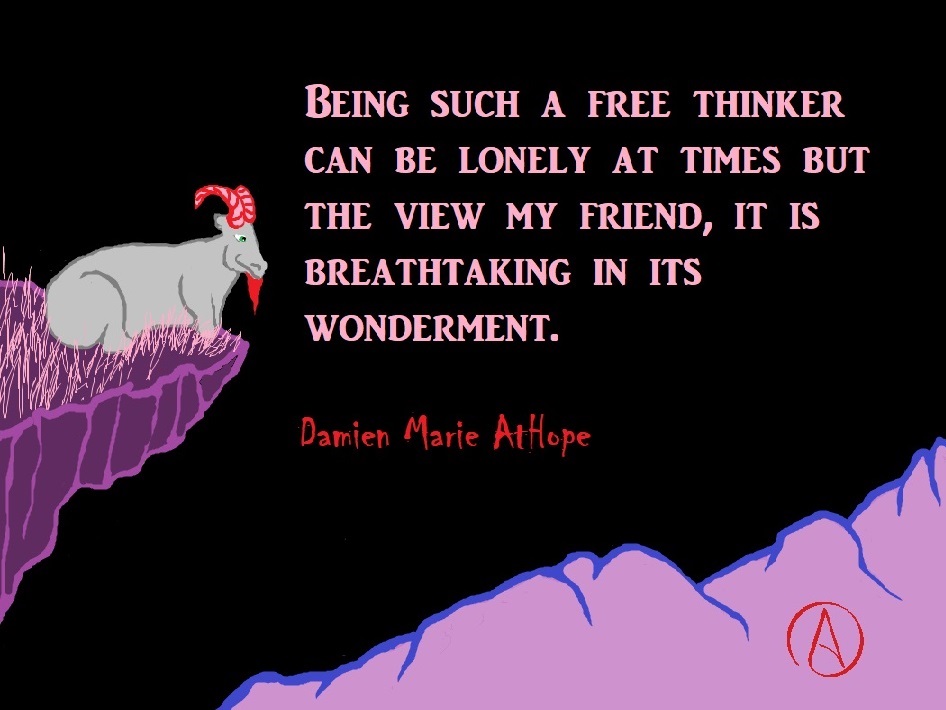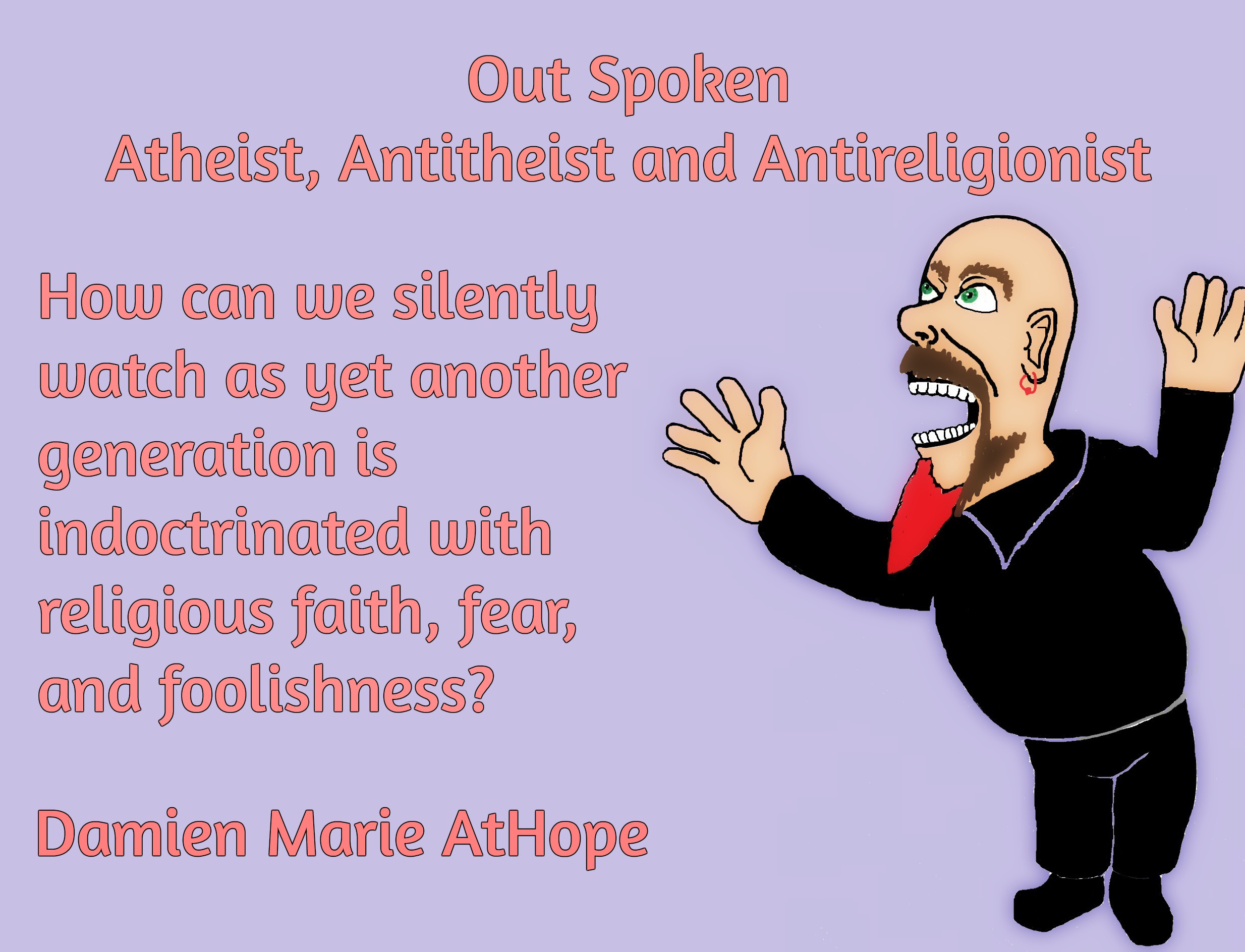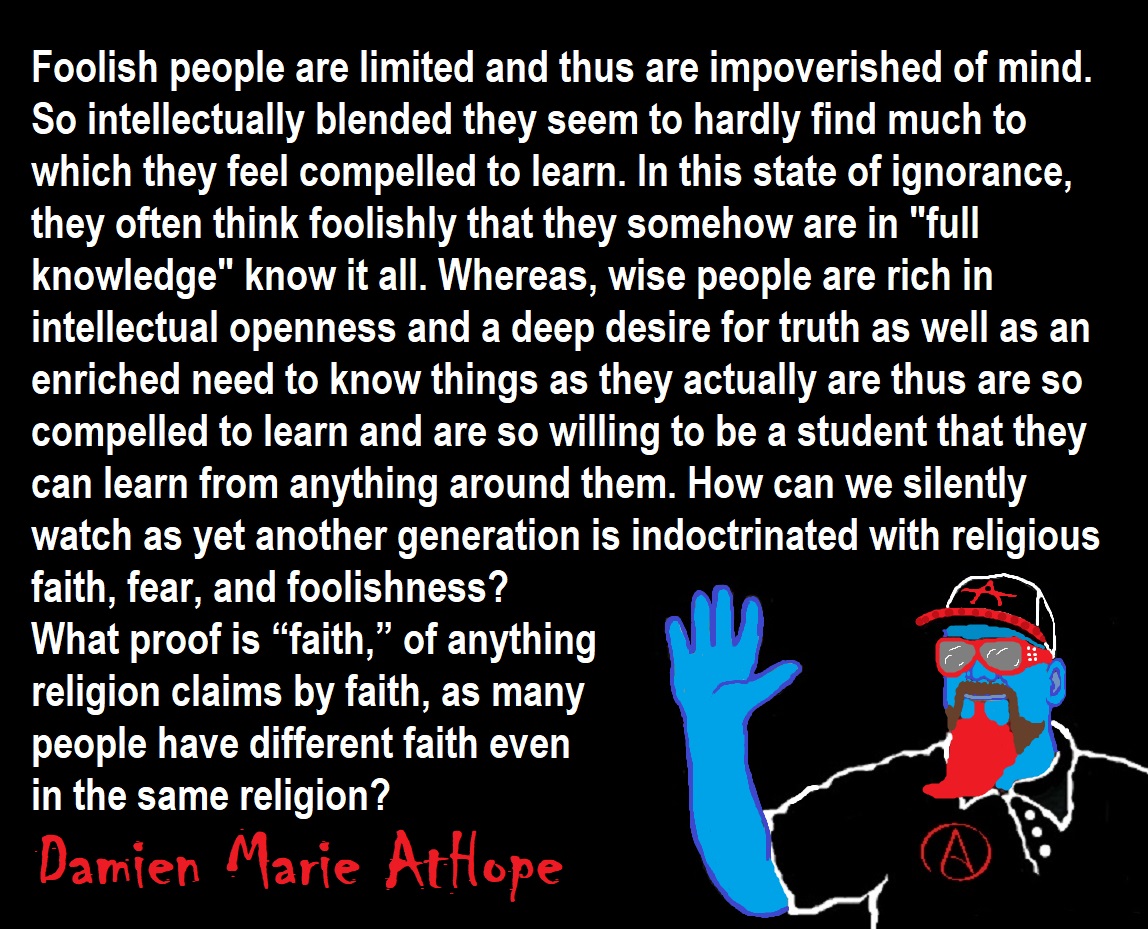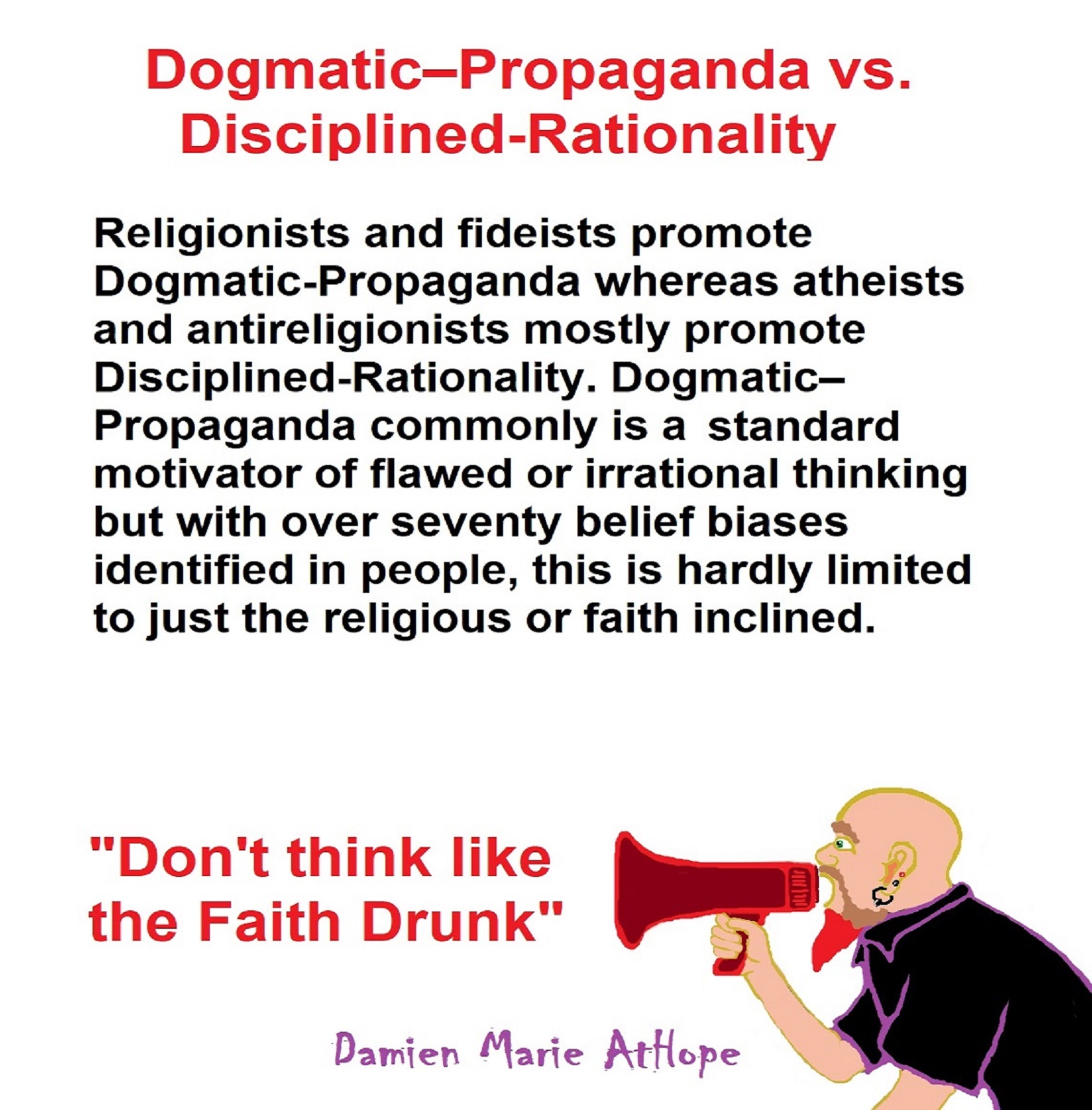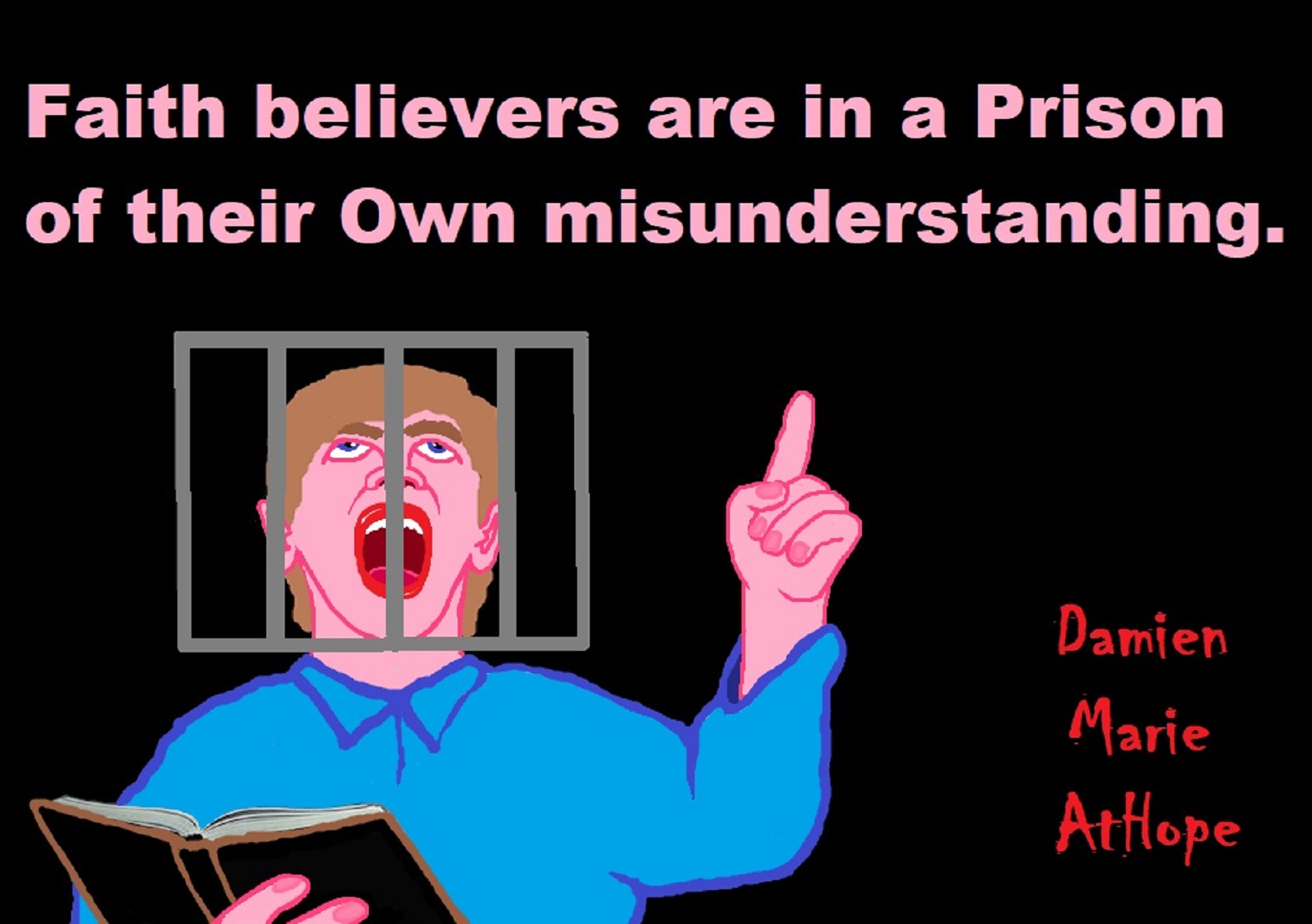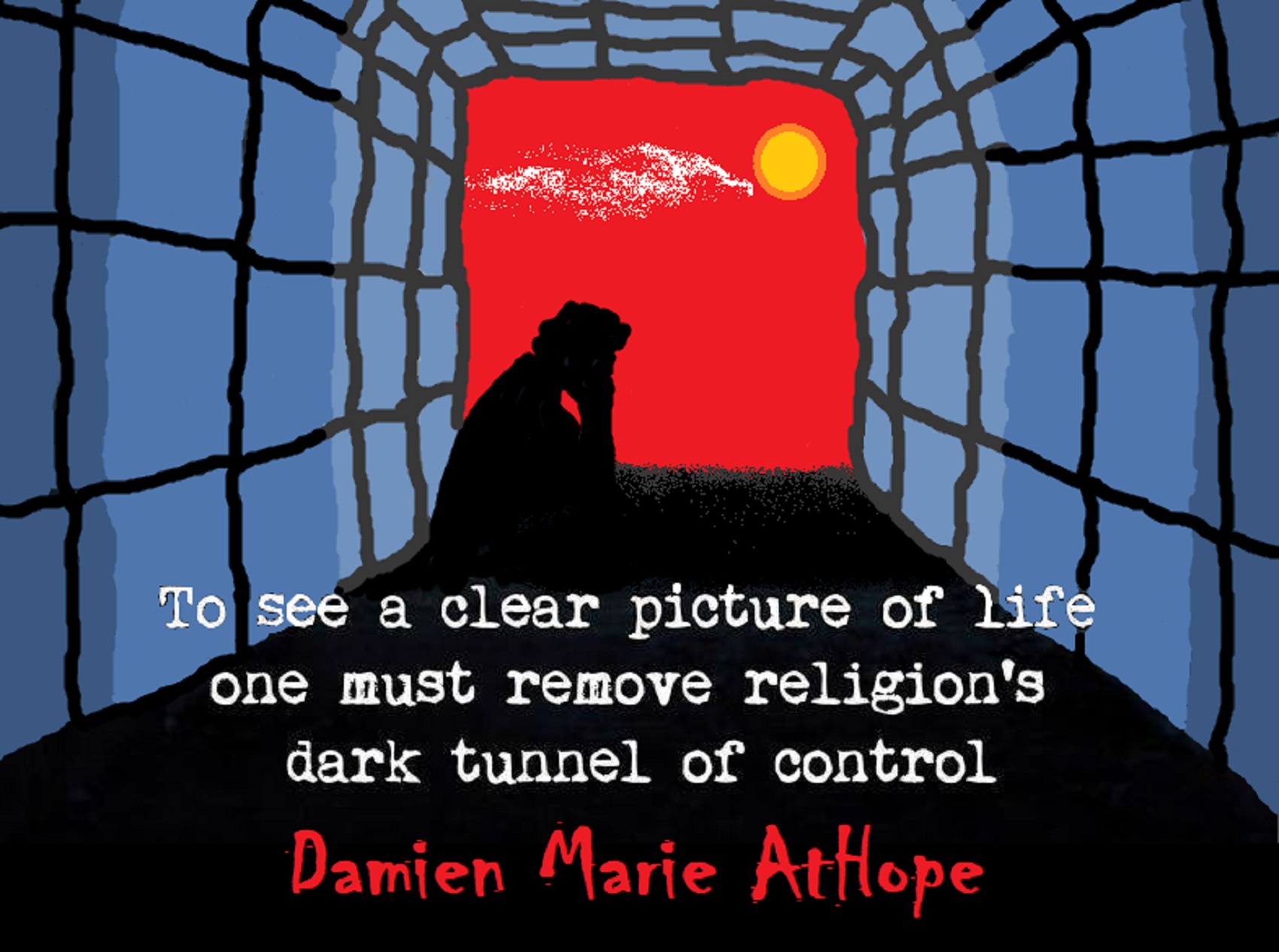
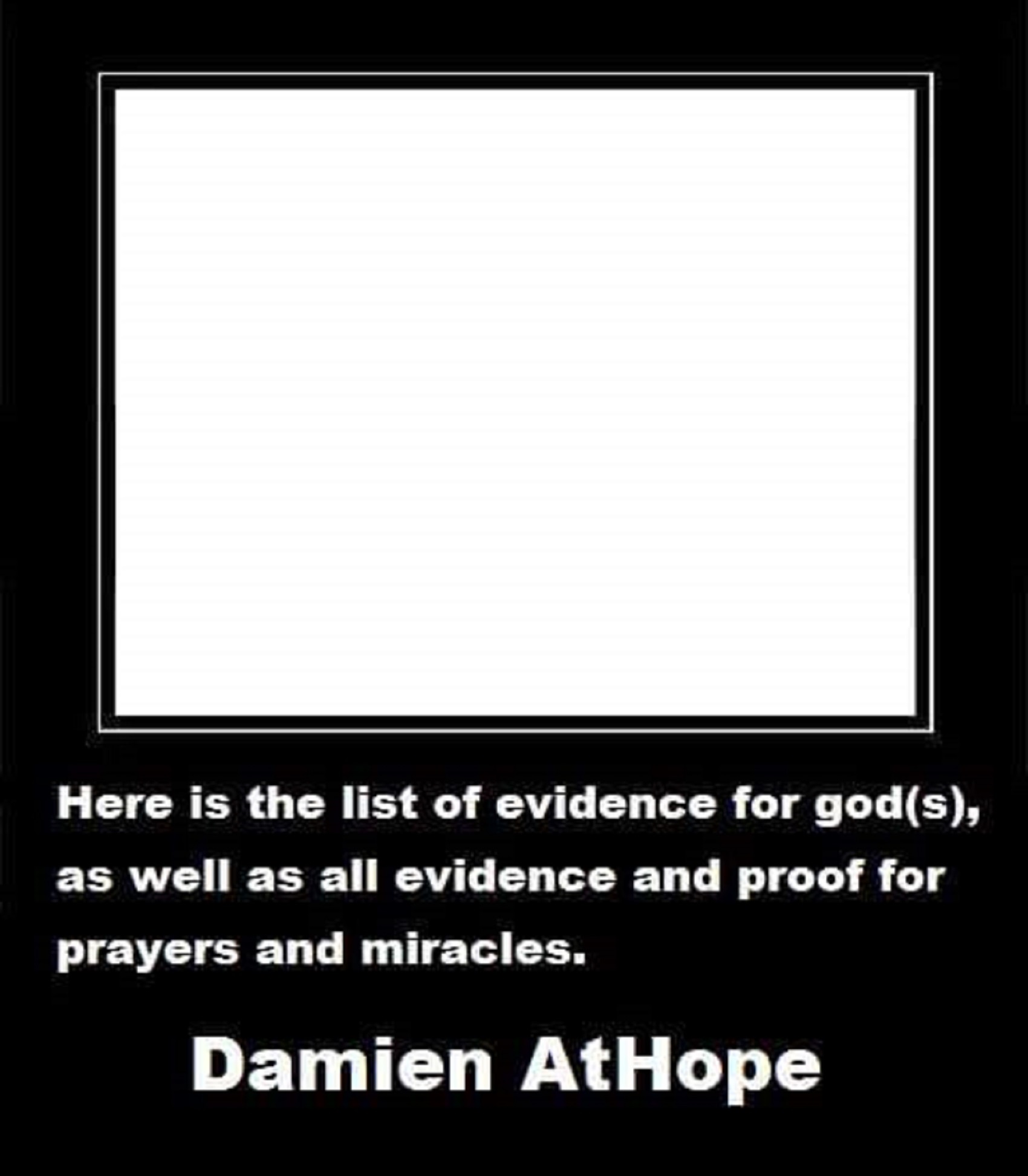
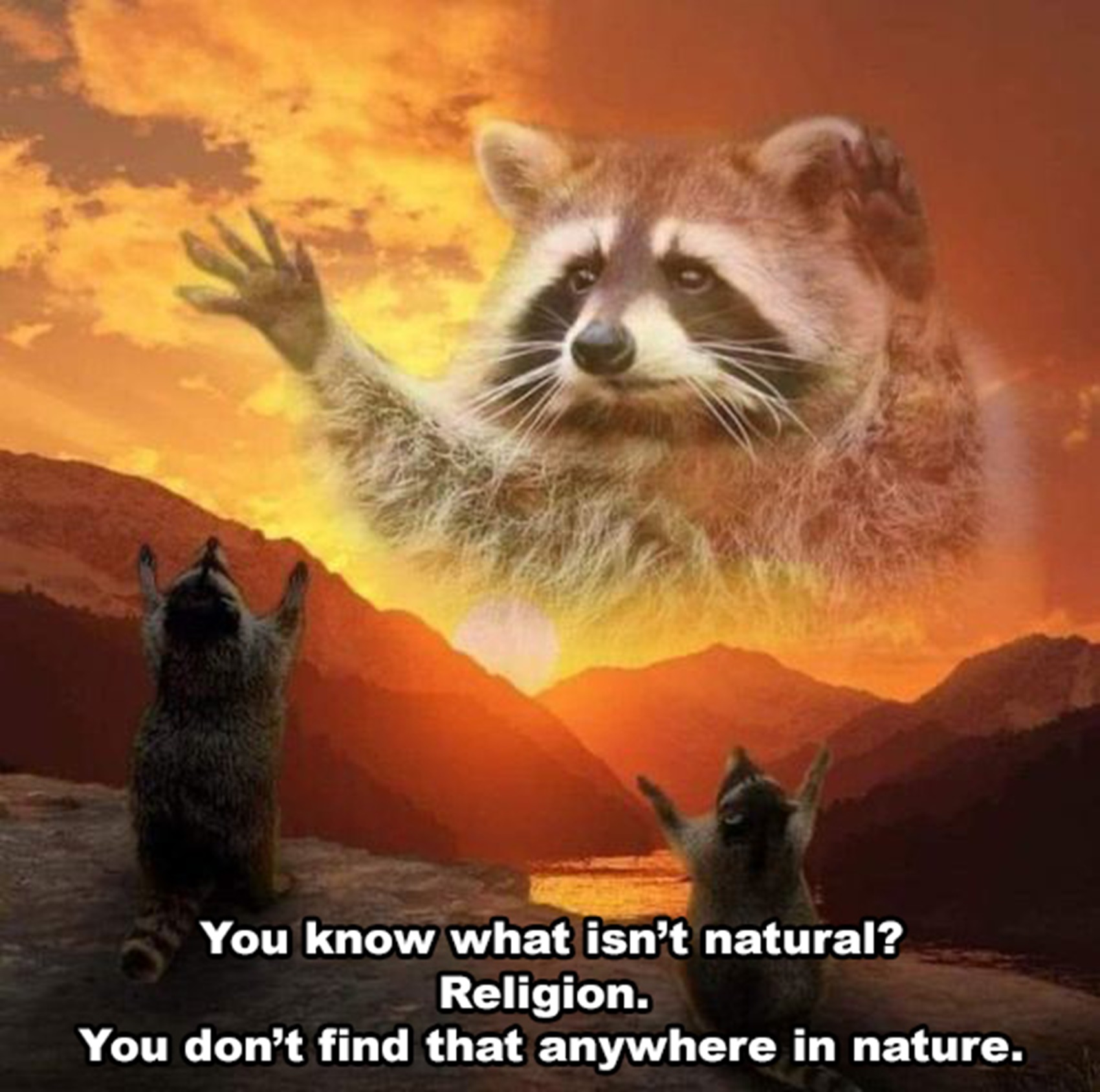
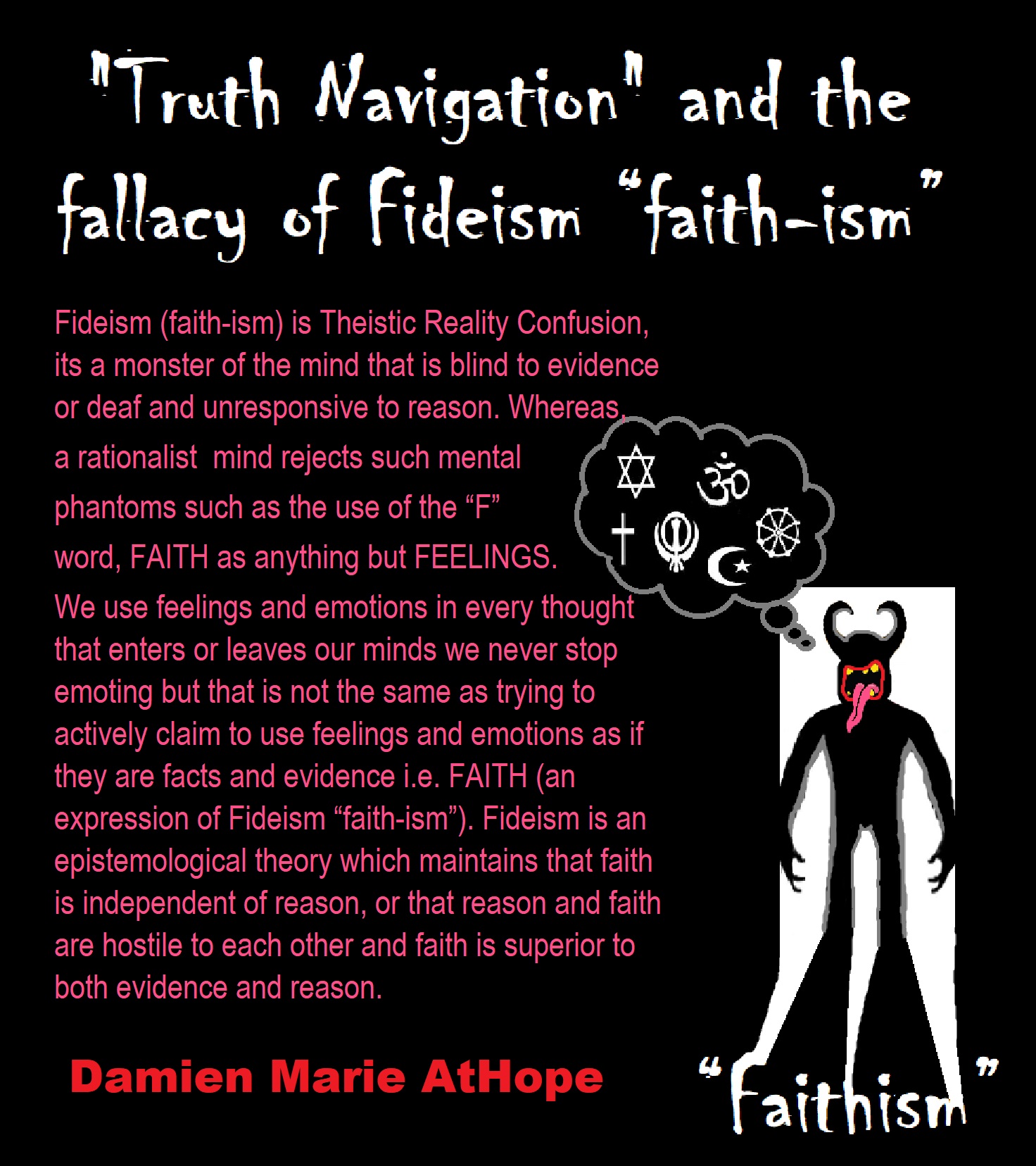
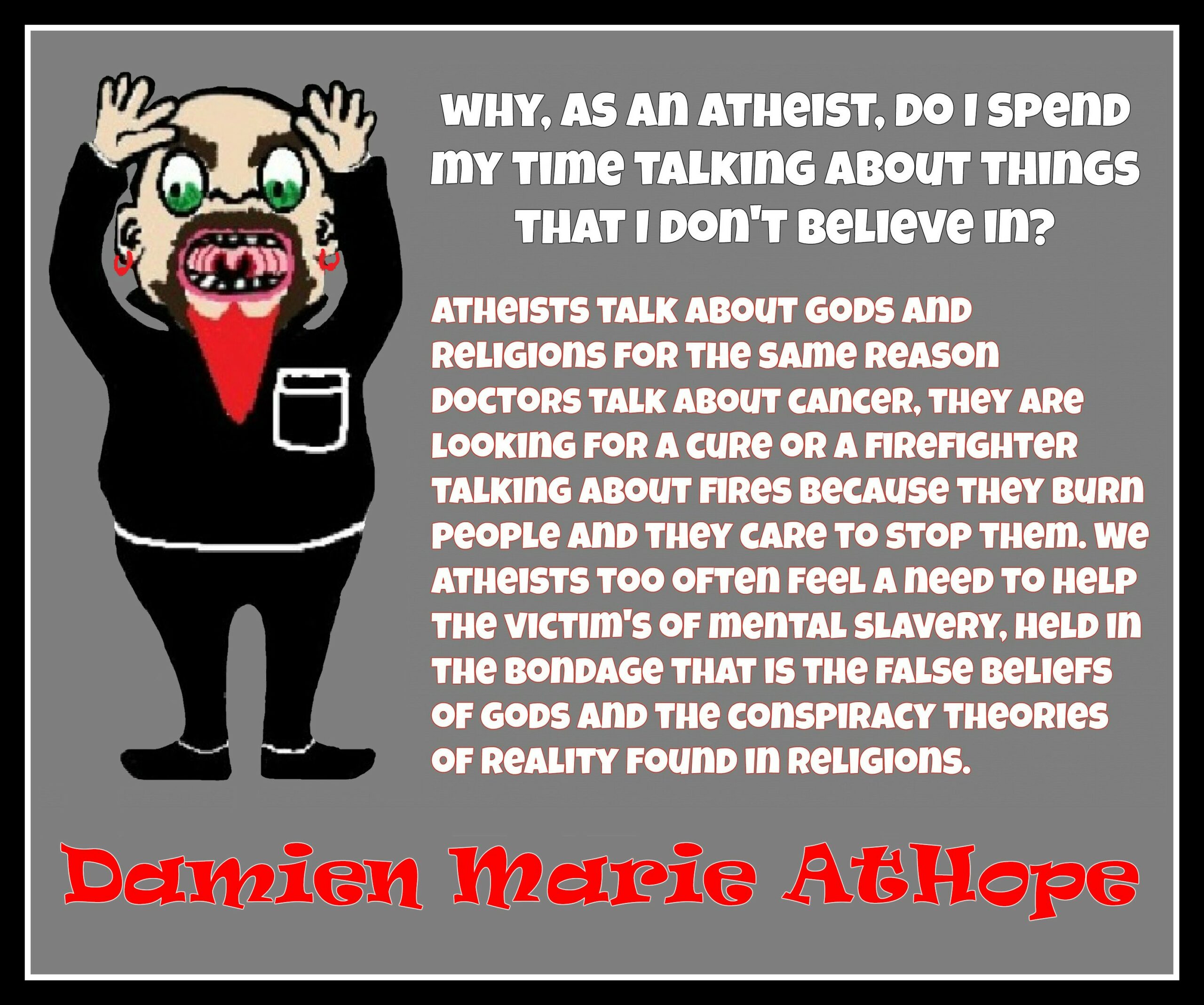
To Believe???
The value (axiology) of archaeology (empirical evidence) is knowledge (epistemology) of the past adding to our intellectual (rational) reality of actual events. On the other hand, myths (collection of stories) inaccurate accounts of the past or tails to establish thinking or behaviors, supporting faith (nonrationality) in some unreal belief, behavior or creative fiction of nonevents or actual events.
gOD is a Dogmatic-Propaganda Product
The god concept is just a manmade concept this includes all claims of anything other than the natural reality we do know. To say one knows it’s to say one has facts or reason connected justifiably to evidence. No one can with epistemic honesty claim to know anything but the natural observable world, one can believe in something else but they do so without evidence. Any so-called evidence for ‘gOD’ is clearly just misunderstanding or misrepresentation because of indoctrination, which is wishful thinking or delusional thinking it’s not truly empiricism nor rationalism. So many people speak for their all-powerful god(s) of the universe, but not one god has ever been proven and all that is offered totally lacks credible evidence of anything real. And as it is ridiculous for a creator of a universe not to even bother making itself known in the universe but for some bizarre esoteric or theological writing, thus no reasonable person should see a reason to conclude something labeled god(s) exists. I hate the abuse of reason the god belief and other religious nonsense can create. The scars others make in a moment; we often have to end up wearing for a lifetime. God is a Dogmatic-Propaganda product made to seem real through indoctrination. And while I can’t stand as thought is as a real thing doesn’t exist but its existence as a real idea is toxic and harmful to many.
Science is a system where justified true beliefs are derived from objective methodologies such as the scientific method and religion is a system of unjustified beliefs based on subjective faith or revelation. While scientists can agree upon the empirical nature of science, the steps from observations to law or theory are not without philosophical issues thus are beliefs.
But as I say they are justified true beliefs validated with reliability following reason and evidence to reach beliefs worthy to be called knowledge religion is not. The issue of word usage of believe is troubling for many science-minded thinkers who don’t get the epistemology consideration of words they mostly think of standard usage.
In epistemology, knowledge is an epistemic property of belief, as in general when a belief is justified and true because of valid and/or reliable reason and evidence it is warranted to be called knowledge. Many still think that ‘to believe’ has no connection with ‘to know’ believing this because it is thought ‘knowledge’ is derived from facts and ‘belief’ is derived without facts, so the verbs knowing and believing to many are therefore seen different.
Science, as we know it is not just an accumulation of facts or evidence from observation and experimentation it is also an interpretation which that can turn into SCIENTIFIC KNOWLEDGE, Scientific Laws, and Scientific theories. But it is this interpretation that reaches conclusions which are “accepted” as knowledge is saying epistemologically are a justified true belief which equals knowledge.
Fear strengthens religious belief as seen in a combat study.
As combat was more frightening, the percentage of soldiers who reported praying rose from 42 to 72%.
In addition, another combat study reviewing combat veterans half a century later showed religion faith varied by their war experience and their positive or negative reactions to or about the war. As in ones who had more negative experience and reactions to or about the war the more religious they were. Soldiers who faced heavy combat attended church around twenty percent more often if they claimed their war experience was negative, but those who claimed their experience was positive attended church over twenty-five percent less often.
This highlights that those who try to say there are no atheists in foxholes are not forming an argument against atheism, but instead are forming an argument against foxholes (war) and how fear is a large motivator for creating religionists/fideists. ref
Religious belief although proclaimed as faith in something is more universal “acceptance”, “surrender” or “compliance” to something, such as ones chosen religious brand of Dogmatic-Propaganda, one’s culture/society and/or one’s family. Religious beliefs often do not even try to hide universal “acceptance”, “surrender” or “compliance” to something they promote it as the ideal. In fact, religious faith is often suggested as a positive path of “acceptance”, “surrender” or “compliance” to achieve a virtuous life in which trusting is then defined as secure belief in god(s) or religion thus Dogmatic-Propaganda.
“I have no beliefs”, is a Confusion (about beliefs) I Hear Some Atheists Say
Ok, well I will humor you. If atheism is to be thought of as a belief system as religionists like to think then its the confirmation of two philosophies Rationalism (reason) and Empiricism (evidence) and in simple terms its the method of only accepting valid as well as reliable reason and evidence. Since god hypothesis claims fail to substantiate with any “evidence” as well as are exposed to contain thinking errors, logical fallacies and internal contradictions it has no warrant nor justification to support “reason” believing it to be in anyway true. Thus, to your belief that Atheism is a belief but you have it backwards, we have credible belief systems that lead us to the conclusion of Atheism which is stating I do not have a belief in gods, which because of the facts in evidence is the only rational choice.
The correspondence theory of truth states that the truth or falsity of a statement is determined only by how it relates to the world and whether it accurately describes (i.e., corresponds with) that world. Reliabilist Epistemology,
Reliabilism is an approach to epistemology that emphasizes the truth-conduciveness of a belief-forming process, method, or other epistemologically relevant factors. The reliability theme appears in theories of knowledge, of justification, and of evidence. “Reliabilism” is sometimes used broadly to refer to any theory that emphasizes truth-getting or truth indicating properties. More commonly it is used narrowly to refer to process reliabilism about justification. This entry discusses reliabilism in both broad and narrow senses but concentrates on the theory of justification. 1. Reliability Theories of Knowledge, 2. Process Reliabilism for Justification. ref, ref
Critical or Analytical Thinking and Suspension of Judgment, Disbelief or Belief
Damien, do you believe in karma?
No, why would I?
If the claim of a god: a superpower being with an ultimate all-knowing mind that is involved in judging and distribution of morality consequences is ridiculous. Then how much more ludicrous is the claim of karma: a beingless mind devoid superpower that is an all-knowing nothingism with an ultimate all knowingness involved in judging and distribution of morality consequences.
Reincarnation is a false belief.
To me, truth is a value judgment we place on what we think or believe is is evidence. Therefore, the rational imperative on us is to demonstrate that the proposed evidence or reasoned assumption is actually of a high epistemic standard with as much valid and reliable reason and evidence as possible from as credible a sore as possible which then makes some believed “Truth” actually worthy to be seen as Epistemologically True thus a “justified true belief”.
Broadly, epistemic means “relating to knowledge (itself) or to the degree of its validation” and epistemological means ” critical study of knowledge validity, methods, as well as limits to knowledge and the study or theory of various aspects of or involved in knowledge”.
As in, I hold the value (axiology) of archaeology (empirical and humanities evidence), which is part of my love for knowledge (epistemology) of the past, adding to our intellectual (rational) awareness of natural reality (correspondence theory of truth) of actual events (scientific realism) understood as involving no magic (metaphysical naturalism). On the other hand, religions and gods are myths (collection of stories) inaccurate accounts of the past (phenomenon perception error) or tails to establish thinking or behaviors, supporting faith (non-rationality) in some unreal belief, behavior or creative fiction of non-events as well as misleading or overblowing actual events (epistemological problems of perception or justification).
And then the problem is people view scientists who are seeking grant money or who push their research findings with extra suspicion, the researchers found. Many Americans view such characters as downright untrustworthy. The lesson for all scientists, the researchers say, is:”Just like other communication, science communication needs to continue to convey warmth and trustworthiness, along with competence and expertise.” In other words, convincing others of the importance of what you’re working on depends not only on being smart and competent but also on connecting and resonating with people.
We’ve actually known that for years. As the study authors write, “Long ago, Aristotle knew that communication is not just about logic and knowledge, but also about emotions and values.” The challenge, it seems, is actually putting that knowledge into practice.
it is a fact because of the quality of the evidence supporting it.
Main Deity or Religious Belief Systems
Neil deGrasse Tyson: If You Don’t Believe in Science, ‘Just Move Back to the Cave’
What makes some believed Truth actually True?
To me, Truth is a value judgment we place on what we think or believe is is evidence. Therefore, the rational imperative on us is to demonstrate that the proposed evidence or reasoned assumption is actually of a high epistemic standard with as much valid and reliable reason and evidence as possible from a credible source as possible which then makes some believed “Truth” actually worthy to be seen as Epistemologically True thus a “justified true belief”.
Broadly, epistemic means “relating to knowledge (itself) or to the degree of its validation” and epistemological means ” critical study of knowledge, validity, methods, as well as limits to knowledge and the study or theory of various aspects of or involved in knowledge”.
There are many philosophical debates about knowledge. However, for the sake of most arguments, I’m fine working from the definition of “justified true beliefs”. But I always do so tentatively as problems could come up (the Gettier problem, etc.).
Therefore, I follow the standard in philosophy Justified True Beliefs = knowledge and when such knowledge reaches a high or the highest epistemic standard it can be dubbed epistemically certain.
To established justification, I use the philosophy called Reliabilism.
Reliabilism is a general approach to epistemology that emphasizes the truth-conduciveness of a belief-forming process, method, or other epistemologically relevant factors. The reliability theme appears both in theories of knowledge and theories of justification.
For the true part, I use the philosophy called The Correspondence Theory of Truth.
The correspondence theory of truth states that the truth or falsity of a statement is determined only by how it relates to the world and whether it accurately describes (i.e., corresponds with) that world.
For the beliefs part, I use what philosophy calls The Ethics of Belief.
The “ethics of belief” refers to a cluster of questions at the intersection of epistemology, philosophy of mind, psychology, and ethics. The central question in the debate is whether there are norms of some sort governing our habits of belief-formation, belief-maintenance, and belief-relinquishment. Is it ever or always morally wrong (or epistemically irrational, or imprudent) to hold a belief on insufficient evidence? Is it ever or always morally right (or epistemically rational, or prudent) to believe on the basis of sufficient evidence, or to withhold belief in the perceived absence of it? Is it ever or always obligatory to seek out all available epistemic evidence for a belief? Are there some ways of obtaining evidence that are themselves immoral or imprudent?
Reference 1 2 3 4 5 6 7 8 9 10 11 12
I am an Out Atheist, Antitheist, and Antireligionist as a Valuized Ethical Duty.
How can we silently watch as yet another generation is indoctrinated with religious faith, fear, and foolishness? Religion and it’s god myths are like a spiritually transmitted disease of the mind. This infection even once cured holds mental disruption which can linger on for a lifetime. What proof is “faith,” of anything religion claims by faith, as many people have different faith even in the same religion? When you start thinking your “out, atheism, antitheism or antireligionism is not vitally needed just remember all the millions of children being indoctrinated and need our help badly and who desperately need our help with the truth. Three things are common in all religions: “pseudo-science,” “pseudo-history,” and “pseudo-morality.” And my biggest thing of all is the widespread forced indoctrination of children, violating their free choice of what to not believe or believe, I hate forced hereditary religion.
Sometimes a heart of kindness is all I have,
my only weapon to fight for the humanity in a world which is seemly intent on harm.
“Damien, how can you be so nice and kind?” – Questioner
My response, It is very hard indeed but it also shows high character and is to me, an act of courage to be kind in an unkind world. But I am not this world, I aspire to much greater higher-heights. I reject this worlds unkindness. I fight for what is true, helpful, good and right. All themes needed for universal betterment and human flourishing. I fight for people not against them. I wish to be a friend to the world, as you can better persuade people with an open hand then angry words. I appeal to their reason as a helpful counselor, mentor, or teacher that would see their possible frustration as a thing in them, not truly a thing meant for me. I know we cannot change things with more of the same. Rather, we must be the hope and changes so profound that t is like we are no longer holding a reality position of the strife before us. This is because we have the skill to aid others, the gift of human kindness as with that we are the most effective. And to me, kindness is invaluable. I just never stop seeing others as equal dignity beings. We rise by helping each other.
No God: No evidence, No intelligence, and No goodness = Valid Atheism Conclusion
- No evidence, to move past the Atheistic Null Hypothesis: There is no God/Gods (in inferential statistics, a Null Hypothesis generally assumed to be true until evidence indicates otherwise. Thus, a Null Hypothesis is a statistical hypothesis that there is no significant difference reached between the claim and the non-claim, as it is relatively provable/demonstratable in reality some way. “The god question” Null Hypothesis is set at as always at the negative standard: Thus, holding that there is no God/Gods, and as god faith is an assumption of the non-evidentiary wishful thinking non-reality of “mystery thing” found in all god talk, until it is demonstratable otherwise to change. Alternative hypothesis: There is a God (offered with no proof: what is a god and how can anyone say they know), therefore, results: Insufficient evidence to overturn the null hypothesis of no God/Gods.
- No intelligence, taking into account the reality of the world we do know with 99 Percent Of The Earth’s Species Are Extinct an intelligent design is ridiculous. Five Mass Extinctions Wiped out 99 Percent of Species that have ever existed on earth. Therefore like a child’s report card having an f they need to retake the class thus, profoundly unintelligent design.
- No goodness, assessed through ethically challenging the good god assumptions as seen in the reality of pain and other harm of which there are many to demonstrates either a god is not sufficiently good, not real or as I would assert, god if responsible for this world, would make it a moral monster ripe for the problem of evil and suffering (Argument from Evil). God would be responsible for all pain as life could easily be less painful and yet there is mass suffering. In fact, to me, every child born with diseases from birth scream out against a caring or loving god with the power to do otherwise. It could be different as there is Congenital insensitivity to pain (CIP), also known as congenital analgesia, in which a person cannot feel (and has never felt) physical pain.[1]
Disproof by logical contradiction
‘A Logical Impossibility’
I am an Axiological (Theoretical and Normative VALUE Theorist philosopher) Atheist
Axiology and Value Theory?
Theoretical philosophy? – Wikipedia
“The division of philosophy into a practical and a theoretical discipline has its origin in Aristotle‘s moral philosophy and natural philosophy categories. Theoretical philosophy is sometimes confused with Analytic philosophy, but the latter is a philosophical movement, embracing certain ideas and methods but dealing with all philosophical subject matters, while the former is a way of sorting philosophical questions into two different categories in the context of a curriculum. – Wikipedia
Here are examples of theoretical philosophy subjects I delve into:
- Ontology
- Epistemology
- Axiology
- Ignosticism
- Rationalism
- Antitheism
- Antireligion
- Anarchism
- Secularism
- Secular humanism
- Humanism
- Theories of truth
- Questions on knowledge
- Practical philosophy
- Logic
- Questions on Morality
- Feminist philosophy
- Philosophy of science
- Philosophy of language
- Philosophy of mind
- Metaphysics
Noradrenaline and our Presumptions of Reality (regulation of the Brain’s ‘Inner World’)?
Axiological “Presumptive-Value”
Your god myth is an Axiological “Presumptive-Value” Failure
I am an Axiological (value theorist) Atheist, and Claims of god are a Presumptive-Value failure. Simply, if you presume a thing is of value that you can’t justify, then you have committed an axiological presumptive value failure.
Axiological “presumptive-value” Success: Sound Thinker: uses disciplined rationality (sound axiological judgment the evaluation of evidence to make a decision) supporting a valid and reliable justification.
Axiological “presumptive-value” Failure: Shallow Thinker: undisciplined, situational, sporadic, or limited thinking (unsound axiological judgment, lacking required evidence to make a “presumptive-value” success decision) lacking the support of a needed valid and reliable justification.
“Ok, So basically, the difference between reasoning with evidence and without?” – Questioner
My response, Well with or without valid justification because of evidence. As in you can’t claim to know the value of something you can’t demonstrate as having good qualities to attach the value claim too so if you lack evidence of the thing in question then you cannot validate its value. So it’s addressing justificationism (uncountable) Theory of justification, An (philosophy standard) approach that regards the justification of a claim as primary, while the claim itself is secondary; thus, criticism consists of trying to show that a claim cannot be reduced to the authority or criteria that it appeals to. Think of is as a use-matrix. If I say this is of great use for that, can you validate its use or value, and can I use this as a valid method to state a valid justification for my claims without evidence to value judge from? No, thus an axiological presumptive-value failure as a valid anything. Theory of justification is a part of epistemology that attempts to understand the justification of propositions and beliefs. Epistemologists are concerned with various epistemic features of belief, which include the ideas of justification, warrant, rationality, and probability. Loosely speaking, justification is the reason that someone (properly) holds a belief. When a claim is in doubt, justification can be used to support the claim and reduce or remove the doubt. Justification can use empiricism (the evidence of the senses), authoritative testimony (the appeal to criteria and authority), or reason. – Wikipedia
“Presumptions are things that are credited as being true until evidence of their falsity is presented. Presumptions have many forms and value (Axiology) is just one. In ethics, value denotes the degree of importance of something or action, with the aim of determining what actions are best to do or what way is best to live (normative ethics), or to describe the significance of different actions. It may be described as treating actions as abstract objects, putting VALUE to them. It deals with right conduct and living a good life, in the sense that a highly, or at least relatively high valuable action may be regarded as ethically “good” (adjective sense), and that an action of low value, or relatively low in value, may be regarded as “bad”. What makes an action valuable may, in turn, depend on the ethic values of the objects it increases, decreases or alters. An object with “ethic value” may be termed an “ethic or philosophic good” (noun sense). Values can be defined as broad preferences concerning appropriate courses of actions or outcomes. As such, values reflect a person’s sense of right and wrong or what “ought” to be. “Equal rights for all”, “Excellence deserves admiration”, and “People should be treated with respect and dignity” are representatives of values. Values tend to influence attitudes and behavior and these types include ethical/moral values, doctrinal/ideological(religious, political) values, social values, and aesthetic values. It is debated whether some values that are not clearly physiologically determined, such as altruism, are intrinsic, and whether some, such as acquisitiveness, should be classified as vices or virtues.” ref, ref
“Sound thinking to me, in a general way, is thinking, reasoning, or belief that tends to make foresight a desire to be as accurate as one can with valid and reliable reason and evidence.”
Sound axiological judgment, to me, a “presumptive-value” success, is value judged opinions expressed as facts with a valid and reliable justification. In an informal and psychological sense, it is used in reference to the quality of cognitive faculties and adjudicational (relating to adjudication) capabilities of particular individuals, typically called wisdom or discernment. In a legal sense, – used in the context of a legal trial, to refer to a final finding, statement, or ruling, based on a considered weighing of evidence, called, “adjudication“.
Sound Thinkers don’t value FAITH
Sound thinking to me, in a general way, is thinking, reasoning, or belief
that tends to make foresight a desire to be as accurate as one can
with valid and reliable reason and evidence.
Dogmatic–Propaganda vs. Disciplined-Rationality
Religionists and fideists, promote Dogmatic-Propaganda whereas atheists and antireligionists mostly promote Disciplined-Rationality. Dogmatic–Propaganda commonly is a common motivator of flawed or irrational thinking but with over seventy belief biases identified in people, this is hardly limited to just the religious or faith inclined. Let me illustrate what I am saying, to me all theists are believing lies or irrationally in that aspect of their lives relating to god belief. So the fact of any other common intellectual indexers where there may be right reason in beliefs cannot remove the flawed god belief corruption being committed. What I am saying is like this if you kill one person you are a killer. If you believe in one “god” I know you are a follower of Dogmatic-Propaganda and can not completely be a follower of Disciplined-Rationality. However, I am not proclaiming all atheists are always rational as irrationally is revolving door many people believe or otherwise seem to stumble through. It’s just that god belief does this with intentionally.
Disciplined-Rationality is motivated by principles of correct reasoning with emphasis on valid and reliable methods or theories leading to a range of rational standpoints or conclusions understanding that concepts and beliefs often have consequences thus hold an imperative for truth or at least as close to truth as can be acquired rejecting untruth. Disciplined-Rationality can be seen as an aid in understanding the fundamentals for knowledge, sound evidence, justified true belief and involves things like decision theory and the concern with identifying the value(s), reasonableness, verification, certainties, uncertainties and other relevant issues resulting in the most clear optimal decision/conclusion and/or belief/disbelief. Disciplined-Rationality attempts to understand the justification or lack thereof in propositions and beliefs concerning its self with various epistemic features of belief, truth, and/or knowledge, which include the ideas of justification, warrant, rationality, reliability, validity, and probability.
ps. “Sound Thinker”, “Shallow Thinker”, “Dogmatic–Propaganda” & “Disciplined-Rationality” are concepts/terms I created*
Axiological atheism can be thought to involve ethical/value theory reasoned and moral argument driven apatheism, ignosticism, atheism, anti-theism, anti-religionism, secularism, and humanism. The valuations move up the latter as the levels of evaluation is made to value judge all the elements to better understand the value or disvalue available to reach the most accurate valuation reasonable with a sound aware value conciseness. Axiological atheism can be thought to involve Ethical Atheism.
1. Apatheism: we are born and by the fact reality is devoid of magic removes theological desires to understand the obvious naturalistic world, until we learn otherwise. (a “presumptive-value” failure, thus no motivation to adequately start the evaluation needed to understand if there is real value for an Axiology assessment to accurately place it in the value hierarchy). = no value
2. Ignosticism: Sees theological arguments and language as equivocation, contradictory, and/or un-cognitively relatable other than emotionalism or the like. I see Ignosticism as using the Theological non-cognitivism arguments of “mind understanding issues” (rationalism challenging) and an evidentialist/verificationist arguments of “lacking evidence issues” (empiricism challenging). As an atheist, I am a person who disbelieves or lacks belief in the existence of god or gods. In my non-belief, I am also ignostic feeling that every theological position assumes too much about the concept of god(s). As an ignostic, I am a person who rational no idea of anything from reality whatever to label as “a concept of god” thus I can say I have no idea of anything that can connect to the term god and no reason to think anyone else can either. (again a “presumptive-value” failure, no good Ontology of the thing for Identifying values that could influence belief but without what is needed to understand if there is real value for an axiology assessment to accurately place it in the value hierarchy). = no value
3. Atheism: How can we not reject the concept of gods, aka: supposed supreme magical beings, when not even some simple magic is supported in reality. So how then is it not even more ridiculous to claim some supreme magic aka: gods which are even further from reality. May I remind you that faith in the acquisition of knowledge is not a valid method worth believing in. Because, what proof is “faith”, of anything religion claims by faith, as many people have different faith even in the same religion? As an atheist, I am a person who disbelieves or lacks belief in the existence of god or gods. In my non-belief, I am also ignostic feeling that every theological position assumes too much about the concept of god(s). As an ignostic, I am a person who rational no idea of anything from reality whatever to label as “a concept of god” thus I can say I have no idea of anything that can connect to the term god and no reason to think anyone else can either. Atheists talk about gods and religions for the same reason doctors talk about cancer, they are looking for a cure or a firefighter talking about fires because they burn people and they care to stop them. We atheists too often feel a need to help the victim’s of mental slavery, held in the bondage that is the false beliefs of gods and the conspiracy theories of reality found in religions. If you think you believe in a god, “what do you mean by god,” saying a name tells me not one thing about the thing I am asking to know “its” beingness / thingness / attributes / qualities. Thus, what is the thing “god” to which you are talking about and I want you to explain its beingness /thingness / attributes/ qualities? Religious/theistic people with supernatural beliefs often seem as though they haven’t thought much about and that is something we can help using ontology questions about the beingness / thingness / attributes/ qualities they are trying to refer too. What do you mean by god, when you use the term god? And, I am not asking you for the name you attach to the thing you label as a god. I don’t need to know what the god you believe is known “by.” I am asking, what is the thing you are naming as a god and what that thing is, its qualities in every detail like all things have if they are real. Are you just making stuff up or guessing/hoping or just promoting unjustified ideas you want to believe, what is a god? As an atheist, I feel more wonder than I did as a theist because I thought, “big deal” to any wonder I experienced, thinking god could do anything. So with such an unrealistic mindset, everything lost its wonder but it’s the opposite as an atheist. As a theist, the world was full of superstitions and supernatural magic possibilities and thus utilized thinking that was not in the real world. As an atheist all I have now is the real world, not that all atheists seem to get this, we all are in a real world devoid of magic anything, therefore, everything adds to my feeling of awe. There should be little debate with atheist acknowledging discernable reality compared to theists with non-reality claims. Yes, I have way more awe and wonder as an atheist than I ever had as a theist because as a theist anything was possible with god. Therefore, as a theist things where not that amazing. However, as an atheist grasping what an absolute accidental or how random things are, with a 95 to 99 % of all life ever existing on this planet went extinct. I am thoroughly amazed we are even here the evolved children of ancient exploded stars, likely born in galaxies born in super-massive black holes, it’s all amazing. There is no evidence for Gods. But is their proposition outside of reason? As always start in reality from the evidence we do know, such as never in the history of scientific research or investigation has any supernatural claims shown to be true. So it is completely outside of possibility and is utterly ridiculous. Therefore, belief should be rejected as there are no warrants at all and it is axiologically unworthy to such a preponderance to demand disbelief. (yet again a “presumptive value” failure, no good Ontology of the thing not the cognitively meaningful claims relatable to reality that must be attached to all magic and gods claims for Identifying values that could influence belief but without what is needed to understand if there is real value for an axiology assessment to accurately place it in the value hierarchy).
4. Antitheism: Anti-theism requires more than either merely disbelieving in gods or even denying the existence of gods. Anti-theism requires a couple of specific and additional beliefs: first, that theism is harmful to the believer, harmful to society, harmful to politics, harmful, to culture, etc.; second, that theism can and should be countered in order to reduce the harm it causes. If a person believes these things, then they will likely be an anti-theist who works against theism by arguing that it be abandoned, promoting alternatives, or perhaps even supporting measures to suppress it. It’s worth noting here that, however, unlikely it may be in practice, it’s possible in theory for a theist to be an anti-theist. This may sound bizarre at first, but remember that some people have argued in favor of promoting false beliefs if they are socially useful. To me, I think many may have a misconception of the term. Atheism and anti-theism so often occur together at the same time and in the same person that it’s understandable if many individuals fail to realize that they aren’t the same. Making a note of the difference is important, however, because not every atheist is anti-theistic and even those who are, aren’t anti-theistic all the time. Atheism is simply the absence of belief in gods; anti-theism is a conscious and deliberate opposition to theism. Many atheists are also anti-theists, but not all and not always. To me as an antitheist, I see the concept of gods antihumanistic and wholly harmful to a free humanity and if the so-called gods somehow do end up being real that I will switch to direct opposition as I would any tyrant oppressing humanity. Antitheism (sometimes anti-theism) is a term used to describe an opposition to theism. The term has had a range of applications and definitions. In secular contexts, it typically refers to direct opposition to the validity of theism, but not necessarily to the existence of a deity. As an anti-theist, I am a person who is active in opposition to theism: both the concepts of god(s) as well as the religions that support them. This is because theistic concepts and theistic religions are harmful and that even if theistic beliefs were true, they would be undesirable. (And, again a “presumptive value” failure, of the other value challenges of the lesser evaluations and value judgments addressed in the apatheism, ignosticism, atheism value judgment conclusion and an Axiological Atheism assessment of the god concept that must be attached to all magic and gods claims Identifying a lack of value and/or disvalue that influence harm to real value in an axiology assessment to accurately place its value violations in the value hierarchy).
5. Antireligionism: Not just Atheist, axiological atheists should be antitheists but this generally will involve anti-religionism. it would generally thus hold anti-religionist thinking. Especially, I am an anti-religionist, not just an atheist, and here is why summed up in three ideas I am against. And, in which these three things are common in all religions: “pseudo-science”, “pseudo-history”, and “pseudo-morality”. And my biggest thing of all is the widespread forced indoctrination of children, violating their free choice of what to not believe or believe, I hate forced hereditary religion. And my biggest thing of all is the widespread forced indoctrination of children, violating their free choice of what to not believe or believe, I hate forced hereditary religion. As well as wish to offer strong critiques regarding the pseudo-meaning of the “three letter noise” people call “G.o.d” (group originated delusion)! As an anti-religionist, I am a person who can look at religion on the whole and see it is detrimental to the progress of humanity thus am in opposition to all and every religion, not even just opposition to organized religion. In case you were wondering, I am anti-pseudoscience, anti-supernatural, and anti-superstition as well. May I not be a silent watcher as millions of children are subjugated almost before their birth let alone when they can understand thought and are forcibly coerced, compelled, constrained, and indoctrinated in the mental pollution that religion can be. My main goal against religion is to fully stop as much as possible forced indoctrination, one could ask but then why do I challenge all adults faith? well, who do you think is doing the lying to children in the first place. End Hereditary religion, if its a belief let them the equal right to choose to believe. “Religion is an Evolved Product” and Yes, Religion is Like Fear Given Wings… (And, one last time a “presumptive value” failure, of the other value challenges of the lesser evaluations and value judgments addressed in the apatheism, ignosticism, atheism value judgment conclusion and an Axiological Atheism assessment of the god concept and anti-theism assessment of the god show not just a lack of value but a possibly or likely harm demonstrating bot just a lack of value but a real disvalue and that includes the religions potentially removing value in an axiology assessment to accurately place it in the value hierarchy).
6. Secularism: is the only honorable way to value the dignity of others. If it was not true that there is a large unequal distribution of religion contributing to violence then there would be equal religion and atheist secularism violence. You do not see atheists bombing agnostics the very idea is laughable however even different branches of the same religion do will and have killed one another. So, violence not who we are it’s something we need to be compelled to do. Therefore, please support secularism. We are all one connected human family, proven by DNA showing we should treat each other as fellow dignity beings, supported equally (no gods and no masters). States may often have powers, but only citizens have the glue of morality we call rights. And, as they say, in my “dream society”, lots of things are free (aka. planting free food everywhere, free to everyone); but I wonder what you mean when people say you can’t just let things be free, I think, yeah, how can I take free stuff from a free earth. If one observes the virtues of (T. R. U. E. “The Rational Universal Ethics” or “The Responsible Universal Ethics”) that connect to all things as that of the connectedness equality like those which mirror the rays of the sun, fall down equally with a blind but fair indifference. (what is being expressed is that this sun shining will not favor one over another, no, the same upon everyone offering its light to all plant, animal, human, women, men, single or married, homosexual, bisexual, heterosexual, nonreligious, religious, people of means and those without, able-bodied and those which special needs, people of color, and those who are not, those with access to resources and those which out, young and elderly, etc.) All who wish to follow T. R. U. E. thus embodying a universalize equalitarian standard of ethics should strive to be like a ray of connected light to the world, shining equally and freedom to all of the world. By such efforts a nonbiased unitive ethical approach is possible, one would have an increase in positive feelings to help others understanding equalitarian connectedness. If you don’t think different you will not behave differently, if you have never lived differently it is hard to see things differently and if you do not strive to understand difference one is thus unknowingly or not bound by limited encapsulation. I am for a Free Secular Society. I am not for oppression or abuse of religious believer and want a free secular society with both freedoms of religion and freedom from religion. Even though I wish the end of faith and believing in myths and superstition, I wish this by means of informing the willing and not force of the unwilling. I will openly challenge and rebuff religious falsehoods and misunderstanding as well as rebuke and ridicule harmful or unethical religious ideology or behavior.
7. Humanism: is the philosophic thinking that humans can solve human problems by human means, without feeling a need to appeal to the likes of holy books, mystical anything, nor the belief in gods or religions. But, instead, aspires to a true belief in humanity, viewing it with a persuasion of equality. This caring realist thinking found in humanism utilizes an unstated assumption or aspiration, to do no harm as much as possible and to do good whenever one can. Moreover, we are all one connected human family, proven by DNA showing we should treat each other as fellow dignity beings, supported equally. And, no one really owns the earth, we may make claims to it even draw lines on maps thinking this makes the fantasy borders, illusion supported by force and the potential for threat. Thus the ethical truth is we need to share the earth as communally as possible. And use the resources as safe and ethically as possible striving towards sharing and caring. (do no Harm and do good = Humanism). My core definition of humanism is that humans can solve human problems by human means. I am not saying other things can’t or shouldn’t be added to it but to me, a definition of humanism must always contain something coherent to such a thinking or not contradict such as I have offered. Thus, why it is appropriate to say “good without god” when one is a humanist.
I was asked what is my favorite put down of believers.
Well, I don’t worry about putting anyone down, my goal is offering info to challenge what believers think they know hoping to change their minds. When I post other more offensive stuff it is more for the enjoyment of nonbelievers than attacks at believers, though if it offends believers, who cares, as no one has the right to not be offended.
My motto is attack thinking, not people.
- If you believe in science as well as evolution how do you believe in an afterlife?
- I Believe Archaeology, not Myths & Why Not, as the Religious Myths Already Violate Reason!
- You say you believe in a possibility of your favored god-claim?
- gOD Believer, Pease Think Critically
- “Hammer of Truth” response to “Do you Believe in god?”
- Why not Find Out if what you believe is True?
- What’s Wrong Believer?
- Christianity Believers: Consider This
- Don’t Just Believe
- Believe in Good, Humanist Morality?
- Christians Don’t Believe the Entire Bible
- Believe in Gods? No Thanks, There is a Better Way. 🙂
- “My correspondence with a believer in souls”
- Talking to Teach not Just Attack
- Talking with Jennifer (Shaw) Hancock (Humanist Educator) on Humanism, Atheism, Beliefs, and Morality
- Truth Navigation: “Belief-Etiquette”
- Good Belief-Etiquette = Disciplined-Rationality (addressing The Ethics of Belief)
- Addressing The Ethics of Belief and Logical Fallacies
- Hammer of Truth: Yes, you too, have lots of beliefs…
- Bill Zuersher and his book “Seeing through Christianity: A Critique of Beliefs and Evidence”
- Thinking About Our Belief Motivation
- Religion vs. Science, Don’t Confuse Beliefs
- Grief While Having Atheistic Disbelief
- Doubt or Disbelief Requires Justification just like all Other Beliefs.
- Epistemically Rational with Beliefs?


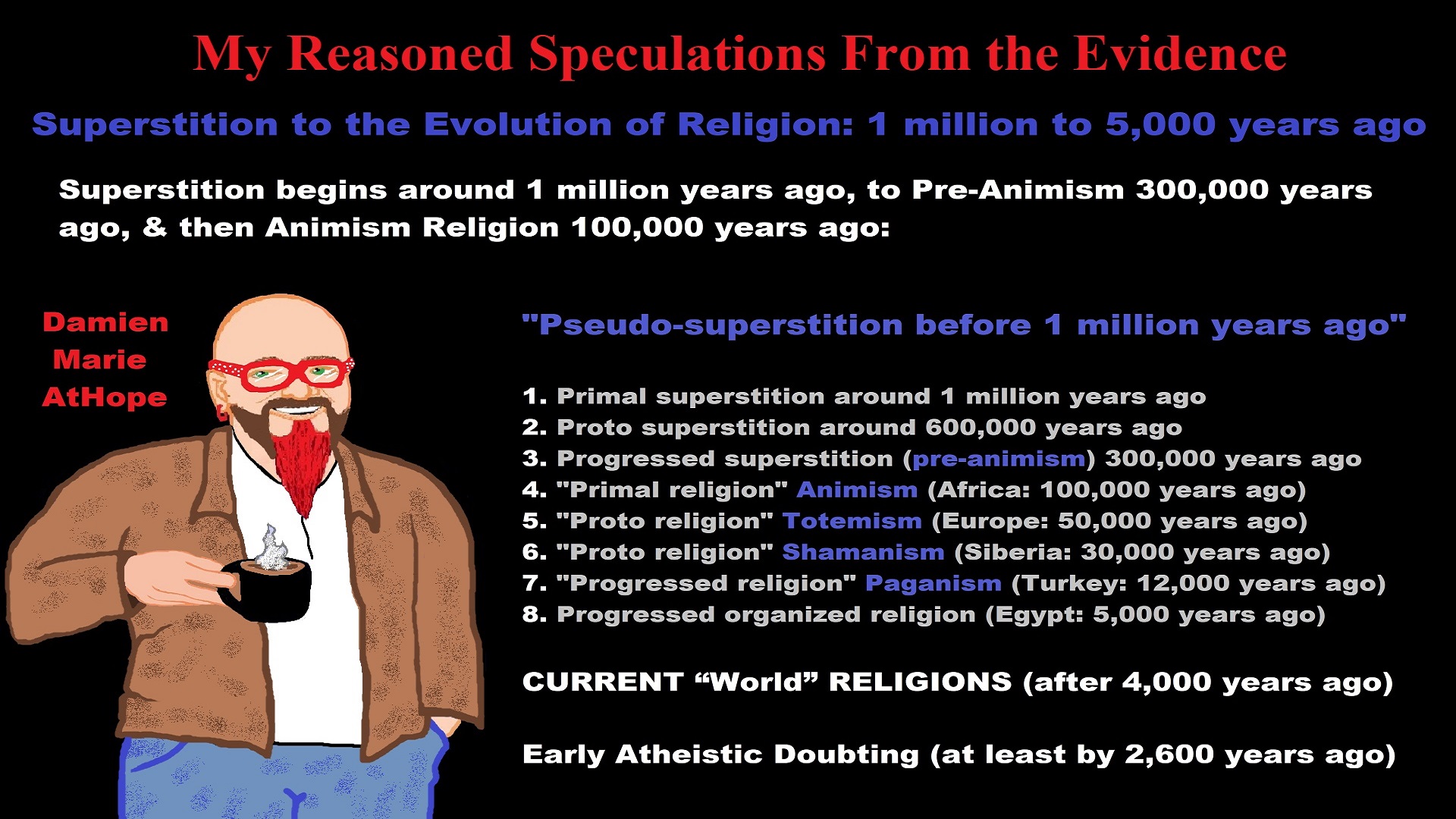
My thoughts on Religion Evolution with external links for more info:
- (Pre-Animism Africa mainly, but also Europe, and Asia at least 300,000 years ago), (Pre-Animism – Oxford Dictionaries)
- (Animism Africa around 100,000 years ago), (Animism – Britannica.com)
- (Totemism Europe around 50,000 years ago), (Totemism – Anthropology)
- (Shamanism Siberia around 30,000 years ago), (Shamanism – Britannica.com)
- (Paganism Turkey around 12,000 years ago), (Paganism – BBC Religion)
- (Progressed Organized Religion “Institutional Religion” Egypt around 5,000 years ago), (Ancient Egyptian Religion – Britannica.com)
- (CURRENT “World” RELIGIONS after 4,000 years ago) (Origin of Major Religions – Sacred Texts)
- (Early Atheistic Doubting at least by 2,600 years ago) (History of Atheism – Wikipedia)
“Religion is an Evolved Product” and Yes, Religion is Like Fear Given Wings…
Atheists talk about gods and religions for the same reason doctors talk about cancer, they are looking for a cure, or a firefighter talks about fires because they burn people and they care to stop them. We atheists too often feel a need to help the victims of mental slavery, held in the bondage that is the false beliefs of gods and the conspiracy theories of reality found in religions.
Understanding Religion Evolution:
- Pre-Animism (at least 300,000 years ago)
- Animism (Africa: 100,000 years ago)
- Totemism (Europe: 50,000 years ago)
- Shamanism (Siberia: 30,000 years ago)
- Paganism (Turkey: 12,000 years ago)
- Progressed organized religion (Egypt: 5,000 years ago), (Egypt, the First Dynasty 5,150 years ago)
- CURRENT “World” RELIGIONS (after 4,000 years ago)
- Early Atheistic Doubting (at least by 2,600 years ago)
“An Archaeological/Anthropological Understanding of Religion Evolution”
It seems ancient peoples had to survived amazing threats in a “dangerous universe (by superstition perceived as good and evil),” and human “immorality or imperfection of the soul” which was thought to affect the still living, leading to ancestor worship. This ancestor worship presumably led to the belief in supernatural beings, and then some of these were turned into the belief in gods. This feeble myth called gods were just a human conceived “made from nothing into something over and over, changing, again and again, taking on more as they evolve, all the while they are thought to be special,” but it is just supernatural animistic spirit-belief perceived as sacred.
Quick Evolution of Religion?
Pre-Animism (at least 300,000 years ago) pre-religion is a beginning that evolves into later Animism. So, Religion as we think of it, to me, all starts in a general way with Animism (Africa: 100,000 years ago) (theoretical belief in supernatural powers/spirits), then this is physically expressed in or with Totemism (Europe: 50,000 years ago) (theoretical belief in mythical relationship with powers/spirits through a totem item), which then enlists a full-time specific person to do this worship and believed interacting Shamanism (Siberia/Russia: 30,000 years ago) (theoretical belief in access and influence with spirits through ritual), and then there is the further employment of myths and gods added to all the above giving you Paganism (Turkey: 12,000 years ago) (often a lot more nature-based than most current top world religions, thus hinting to their close link to more ancient religious thinking it stems from). My hypothesis is expressed with an explanation of the building of a theatrical house (modern religions development). Progressed organized religion (Egypt: 5,000 years ago) with CURRENT “World” RELIGIONS (after 4,000 years ago).
Historically, in large city-state societies (such as Egypt or Iraq) starting around 5,000 years ago culminated to make religion something kind of new, a sociocultural-governmental-religious monarchy, where all or at least many of the people of such large city-state societies seem familiar with and committed to the existence of “religion” as the integrated life identity package of control dynamics with a fixed closed magical doctrine, but this juggernaut integrated religion identity package of Dogmatic-Propaganda certainly did not exist or if developed to an extent it was highly limited in most smaller prehistoric societies as they seem to lack most of the strong control dynamics with a fixed closed magical doctrine (magical beliefs could be at times be added or removed). Many people just want to see developed religious dynamics everywhere even if it is not. Instead, all that is found is largely fragments until the domestication of religion.
Religions, as we think of them today, are a new fad, even if they go back to around 6,000 years in the timeline of human existence, this amounts to almost nothing when seen in the long slow evolution of religion at least around 70,000 years ago with one of the oldest ritual worship. Stone Snake of South Africa: “first human worship” 70,000 years ago. This message of how religion and gods among them are clearly a man-made thing that was developed slowly as it was invented and then implemented peace by peace discrediting them all. Which seems to be a simple point some are just not grasping how devastating to any claims of truth when we can see the lie clearly in the archeological sites.
I wish people fought as hard for the actual values as they fight for the group/clan names political or otherwise they think support values. Every amount spent on war is theft to children in need of food or the homeless kept from shelter.
Here are several of my blog posts on history:
- To Find Truth You Must First Look
- (Magdalenian/Iberomaurusian) Connections to the First Paganists of the early Neolithic Near East Dating from around 17,000 to 12,000 Years Ago
- Natufians: an Ancient People at the Origins of Agriculture and Sedentary Life
- Possible Clan Leader/Special “MALE” Ancestor Totem Poles At Least 13,500 years ago?
- Jewish People with DNA at least 13,200 years old, Judaism, and the Origins of Some of its Ideas
- Baltic Reindeer Hunters: Swiderian, Lyngby, Ahrensburgian, and Krasnosillya cultures 12,020 to 11,020 years ago are evidence of powerful migratory waves during the last 13,000 years and a genetic link to Saami and the Finno-Ugric peoples.
- The Rise of Inequality: patriarchy and state hierarchy inequality
- Fertile Crescent 12,500 – 9,500 Years Ago: fertility and death cult belief system?
- 12,400 – 11,700 Years Ago – Kortik Tepe (Turkey) Pre/early-Agriculture Cultic Ritualism
- Ritualistic Bird Symbolism at Gobekli Tepe and its “Ancestor Cult”
- Male-Homosexual (female-like) / Trans-woman (female) Seated Figurine from Gobekli Tepe
- Could a 12,000-year-old Bull Geoglyph at Göbekli Tepe relate to older Bull and Female Art 25,000 years ago and Later Goddess and the Bull cults like Catal Huyuk?
- Sedentism and the Creation of goddesses around 12,000 years ago as well as male gods after 7,000 years ago.
- Alcohol, where Agriculture and Religion Become one? Such as Gobekli Tepe’s Ritualistic use of Grain as Food and Ritual Drink
- Neolithic Ritual Sites with T-Pillars and other Cultic Pillars
- Paganism: Goddesses around 12,000 years ago then Male Gods after 7,000 years ago
- First Patriarchy: Split of Women’s Status around 12,000 years ago & First Hierarchy: fall of Women’s Status around 5,000 years ago.
- Natufians: an Ancient People at the Origins of Agriculture and Sedentary Life
- J DNA and the Spread of Agricultural Religion (paganism)
- Paganism: an approximately 12,000-year-old belief system
- Paganism 12,000 years old: related to “Anarchism and Socialism” (Pre-Capitalism)
- Shaman burial in Israel 12,000 years ago and the Shamanism Phenomena
- Need to Mythicized: gods and goddesses
- 12,000 – 7,000 Years Ago – Paleo-Indian Culture (The Americas)
- 12,000 – 2,000 Years Ago – Indigenous-Scandinavians (Nordic)
- Norse did not wear helmets with horns?
- Pre-Pottery Neolithic Skull Cult around 11,500 to 8,400 Years Ago?
- 10,400 – 10,100 Years Ago, in Turkey the Nevail Cori Religious Settlement
- 9,000-6,500 Years Old Submerged Pre-Pottery/Pottery Neolithic Ritual Settlements off Israel’s Coast
- Catal Huyuk “first religious designed city” around 9,500 to 7,700 years ago (Turkey)
- Cultic Hunting at Catal Huyuk “first religious designed city”
- Special Items and Art as well as Special Elite Burials at Catal Huyuk
- New Rituals and Violence with the appearance of Pottery and People?
- Haplogroup N and its related Uralic Languages and Cultures
- Ainu people, Sámi people, Native Americans, the Ancient North Eurasians, and Paganistic-Shamanism with Totemism
- Ideas, Technology and People from Turkey, Europe, to China and Back again 9,000 to 5,000 years ago?
- First Pottery of Europe and the Related Cultures
- 9,000 years old Neolithic Artifacts Judean Desert and Hills Israel
- 9,000-7,000 years-old Sex and Death Rituals: Cult Sites in Israel, Jordan, and the Sinai
- 9,000-8500 year old Horned Female shaman Bad Dürrenberg Germany
- Neolithic Jewelry and the Spread of Farming in Europe Emerging out of West Turkey
- 8,600-year-old Tortoise Shells in Neolithic graves in central China have Early Writing and Shamanism
- Swing of the Mace: the rise of Elite, Forced Authority, and Inequality begin to Emerge 8,500 years ago?
- Migrations and Changing Europeans Beginning around 8,000 Years Ago
- My “Steppe-Anatolian-Kurgan hypothesis” 8,000/7,000 years ago
- Around 8,000-year-old Shared Idea of the Mistress of Animals, “Ritual” Motif
- Pre-Columbian Red-Paint (red ochre) Maritime Archaic Culture 8,000-3,000 years ago
- 7,522-6,522 years ago Linear Pottery culture which I think relates to Arcane Capitalism’s origins
- Arcane Capitalism: Primitive socialism, Primitive capital, Private ownership, Means of production, Market capitalism, Class discrimination, and Petite bourgeoisie (smaller capitalists)
- 7,500-4,750 years old Ritualistic Cucuteni-Trypillian culture of Moldova, Romania, and Ukraine
- Roots of a changing early society 7,200-6,700 years ago Jordan and Israel
- Agriculture religion (Paganism) with farming reached Britain between about 7,000 to 6,500 or so years ago and seemingly expressed in things like Western Europe’s Long Barrows
- My Thoughts on Possible Migrations of “R” DNA and Proto-Indo-European?
- “Millet” Spreading from China 7,022 years ago to Europe and related Language may have Spread with it leading to Proto-Indo-European
- Proto-Indo-European (PIE), ancestor of Indo-European languages: DNA, Society, Language, and Mythology
- The Dnieper–Donets culture and Asian varieties of Millet from China to the Black Sea region of Europe by 7,022 years ago
- Kurgan 6,000 years ago/dolmens 7,000 years ago: funeral, ritual, and other?
- 7,020 to 6,020-year-old Proto-Indo-European Homeland of Urheimat or proposed home of their Language and Religion
- Ancient Megaliths: Kurgan, Ziggurat, Pyramid, Menhir, Trilithon, Dolman, Kromlech, and Kromlech of Trilithons
- The Mytheme of Ancient North Eurasian Sacred-Dog belief and similar motifs are found in Indo-European, Native American, and Siberian comparative mythology
- Elite Power Accumulation: Ancient Trade, Tokens, Writing, Wealth, Merchants, and Priest-Kings
- Sacred Mounds, Mountains, Kurgans, and Pyramids may hold deep connections?
- Between 7,000-5,000 Years ago, rise of unequal hierarchy elite, leading to a “birth of the State” or worship of power, strong new sexism, oppression of non-elites, and the fall of Women’s equal status
- Paganism 7,000-5,000 years old: related to “Anarchism and Socialism” (Capitalism) (World War 0) Elite & their slaves
- Hell and Underworld mythologies starting maybe as far back as 7,000 to 5,000 years ago with the Proto-Indo-Europeans?
- The First Expression of the Male God around 7,000 years ago?
- White (light complexion skin) Bigotry and Sexism started 7,000 years ago?
- Around 7,000-year-old Shared Idea of the Divine Bird (Tutelary and/or Trickster spirit/deity), “Ritual” Motif
- Nekhbet an Ancient Egyptian Vulture Goddess and Tutelary Deity
- 6,720 to 4,920 years old Ritualistic Hongshan Culture of Inner Mongolia with 5,000-year-old Pyramid Mounds and Temples
- First proto-king in the Balkans, Varna culture around 6,500 years ago?
- 6,500–5,800 years ago in Israel Late Chalcolithic (Copper Age) Period in the Southern Levant Seems to Express Northern Levant Migrations, Cultural and Religious Transfer
- KING OF BEASTS: Master of Animals “Ritual” Motif, around 6,000 years old or older…
- Around 6000-year-old Shared Idea of the Solid Wheel & the Spoked Wheel-Shaped Ritual Motif
- “The Ghassulian Star,” a mysterious 6,000-year-old mural from Jordan; a Proto-Star of Ishtar, Star of Inanna or Star of Venus?
- Religious/Ritual Ideas, including goddesses and gods as well as ritual mounds or pyramids from Northeastern Asia at least 6,000 years old, seemingly filtering to Iran, Iraq, the Mediterranean, Europe, Egypt, and the Americas?
- Maykop (5,720–5,020 years ago) Caucasus region Bronze Age culture-related to Copper Age farmers from the south, influenced by the Ubaid period and Leyla-Tepe culture, as well as influencing the Kura-Araxes culture
- 5-600-year-old Tomb, Mummy, and First Bearded Male Figurine in a Grave
- Kura-Araxes Cultural 5,520 to 4,470 years old DNA traces to the Canaanites, Arabs, and Jews
- Minoan/Cretan (Keftiu) Civilization and Religion around 5,520 to 3,120 years ago
- Evolution Of Science at least by 5,500 years ago
- 5,500 Years old birth of the State, the rise of Hierarchy, and the fall of Women’s status
- “Jiroft culture” 5,100 – 4,200 years ago and the History of Iran
- Stonehenge: Paganistic Burial and Astrological Ritual Complex, England (5,100-3,600 years ago)
- Around 5,000-year-old Shared Idea of the “Tree of Life” Ritual Motif
- Complex rituals for elite, seen from China to Egypt, at least by 5,000 years ago
- Around 5,000 years ago: “Birth of the State” where Religion gets Military Power and Influence
- The Center of the World “Axis Mundi” and/or “Sacred Mountains” Mythology Could Relate to the Altai Mountains, Heart of the Steppe
- Progressed organized religion starts, an approximately 5,000-year-old belief system
- China’s Civilization between 5,000-3,000 years ago, was a time of war and class struggle, violent transition from free clans to a Slave or Elite society
- Origin of Logics is Naturalistic Observation at least by around 5,000 years ago.
- Paganism 5,000 years old: progressed organized religion and the state: related to “Anarchism and Socialism” (Kings and the Rise of the State)
- Ziggurats (multi-platform temples: 4,900 years old) to Pyramids (multi-platform tombs: 4,700 years old)
- Did a 4,520–4,420-year-old Volcano In Turkey Inspire the Bible God?
- Finland’s Horned Shaman and Pre-Horned-God at least 4,500 years ago?
- 4,000-year-Old Dolmens in Israel: A Connected Dolmen Religious Phenomenon?
- Creation myths: From chaos, Ex nihilo, Earth-diver, Emergence, World egg, and World parent
- Bronze Age “Ritual” connections of the Bell Beaker culture with the Corded Ware/Single Grave culture, which were related to the Yamnaya culture and Proto-Indo-European Languages/Religions
- Low Gods (Earth/ Tutelary deity), High Gods (Sky/Supreme deity), and Moralistic Gods (Deity enforcement/divine order)
- The exchange of people, ideas, and material-culture including, to me, the new god (Sky Father) and goddess (Earth Mother) religion between the Cucuteni-Trypillians and others which is then spread far and wide
- Koryaks: Indigenous People of the Russian Far East and Big Raven myths also found in Tlingit, Haida, Tsimshian, and other Indigenous People of North America
- 42 Principles Of Maat (Egyptian Goddess of the justice) around 4,400 years ago, 2000 Years Before Ten Commandments
- “Happy Easter” Well Happy Eostre/Ishter
- 4,320-3,820 years old “Shimao” (North China) site with Totemistic-Shamanistic Paganism and a Stepped Pyramid
- 4,250 to 3,400 Year old Stonehenge from Russia: Arkaim?
- 4,100-year-old beaker with medicinal & flowering plants in a grave of a woman in Scotland
- Early European Farmer ancestry, Kelif el Boroud people with the Cardial Ware culture, and the Bell Beaker culture Paganists too, spread into North Africa, then to the Canary Islands off West Africa
- Flood Accounts: Gilgamesh epic (4,100 years ago) Noah in Genesis (2,600 years ago)
- Paganism 4,000 years old: related to “Anarchism and Socialism” (First Moralistic gods, then the Origin time of Monotheism)
- When was the beginning: TIMELINE OF CURRENT RELIGIONS, which start around 4,000 years ago.
- Early Religions Thought to Express Proto-Monotheistic Systems around 4,000 years ago
- Kultepe? An archaeological site with a 4,000 years old women’s rights document.
- Single God Religions (Monotheism) = “Man-o-theism” started around 4,000 years ago with the Great Sky Spirit/God Tiān (天)?
- Confucianism’s Tiān (Shangdi god 4,000 years old): Supernaturalism, Pantheism or Theism?
- Yes, Your Male God is Ridiculous
- Mythology, a Lunar Deity is a Goddess or God of the Moon
- Sacred Land, Hills, and Mountains: Sami Mythology (Paganistic Shamanism)
- Horse Worship/Sacrifice: mythical union of Ruling Elite/Kingship and the Horse
- The Amorite/Amurru people’s God Amurru “Lord of the Steppe”, relates to the Origins of the Bible God?
- Bronze Age Exotic Trade Routes Spread Quite Far as well as Spread Religious Ideas with Them
- Sami and the Northern Indigenous Peoples Landscape, Language, and its Connection to Religion
- Prototype of Ancient Analemmatic Sundials around 3,900-3,150 years ago and a Possible Solar Connection to gods?
- Judaism is around 3,450 or 3,250 years old. (“Paleo-Hebrew” 3,000 years ago and Torah 2,500 years ago)
- The Weakening of Ancient Trade and the Strengthening of Religions around 3000 years ago?
- Are you aware that there are religions that worship women gods, explain now religion tears women down?
- Animistic, Totemistic, and Paganistic Superstition Origins of bible god and the bible’s Religion.
- Myths and Folklore: “Trickster gods and goddesses”
- Jews, Judaism, and the Origins of Some of its Ideas
- An Old Branch of Religion Still Giving Fruit: Sacred Trees
- Dating the BIBLE: naming names and telling times (written less than 3,000 years ago, provable to 2,200 years ago)
- Did a Volcano Inspire the bible god?
- Dené–Yeniseian language, Old Copper Complex, and Pre-Columbian Mound Builders?
- No “dinosaurs and humans didn’t exist together just because some think they are in the bible itself”
- Sacred Shit and Sacred Animals?
- Everyone Killed in the Bible Flood? “Nephilim” (giants)?
- Hey, Damien dude, I have a question for you regarding “the bible” Exodus.
- Archaeology Disproves the Bible
- Bible Battle, Just More, Bible Babble
- The Jericho Conquest lie?
- Canaanites and Israelites?
- Accurate Account on how did Christianity Began?
- Let’s talk about Christianity.
- So the 10 commandments isn’t anything to go by either right?
- Misinformed christian
- Debunking Jesus?
- Paulism vs Jesus
- Ok, you seem confused so let’s talk about Buddhism.
- Unacknowledged Buddhism: Gods, Savior, Demons, Rebirth, Heavens, Hells, and Terrorism
- His Foolishness The Dalai Lama
- Yin and Yang is sexist with an ORIGIN around 2,300 years ago?
- I Believe Archaeology, not Myths & Why Not, as the Religious Myths Already Violate Reason!
- Archaeological, Scientific, & Philosophic evidence shows the god myth is man-made nonsense.
- Aquatic Ape Theory/Hypothesis? As Always, Just Pseudoscience.
- Ancient Aliens Conspiracy Theorists are Pseudohistorians
- The Pseudohistoric and Pseudoscientific claims about “Bakoni Ruins” of South Africa
- Why do people think Religion is much more than supernaturalism and superstitionism?
- Religion is an Evolved Product
- Was the Value of Ancient Women Different?
- 1000 to 1100 CE, human sacrifice Cahokia Mounds a pre-Columbian Native American site
- Feminist atheists as far back as the 1800s?
- Promoting Religion as Real is Mentally Harmful to a Flourishing Humanity
- Screw All Religions and Their Toxic lies, they are all fraud
- Forget Religions’ Unfounded Myths, I Have Substantiated “Archaeology Facts.”
- Religion Dispersal throughout the World
- I Hate Religion Just as I Hate all Pseudoscience
- Exposing Scientology, Eckankar, Wicca and Other Nonsense?
- Main deity or religious belief systems
- Quit Trying to Invent Your God From the Scraps of Science.
- Archaeological, Scientific, & Philosophic evidence shows the god myth is man-made nonsense.
- Ancient Alien Conspiracy Theorists: Misunderstanding, Rhetoric, Misinformation, Fabrications, and Lies
- Misinformation, Distortion, and Pseudoscience in Talking with a Christian Creationist
- Judging the Lack of Goodness in Gods, Even the Norse God Odin
- Challenging the Belief in God-like Aliens and Gods in General
- A Challenge to Christian use of Torture Devices?
- Yes, Hinduism is a Religion
- Trump is One of the Most Reactionary Forces of Far-right Christian Extremism
- Was the Bull Head a Symbol of God? Yes!
- Primate Death Rituals
- Christian – “God and Christianity are objectively true”
- Australopithecus afarensis Death Ritual?
- You Claim Global Warming is a Hoax?
- Doubter of Science and Defamer of Atheists?
- I think that sounds like the Bible?
- History of the Antifa (“anti-fascist”) Movements
- Indianapolis Anti-Blasphemy Laws #Free Soheil Rally
- Damien, you repeat the golden rule in so many forms then you say religion is dogmatic?
- Science is a Trustable Methodology whereas Faith is not Trustable at all!
- Was I ever a believer, before I was an atheist?
- Atheists rise in reason
- Mistrust of science?
- Open to Talking About the Definition of ‘God’? But first, we address Faith.
- ‘United Monarchy’ full of splendor and power – Saul, David, and Solomon? Most likely not.
- Is there EXODUS ARCHAEOLOGY? The short answer is “no.”
- Lacking Proof of Bigfoots, Unicorns, and Gods is Just a Lack of Research?
- Religion and Politics: Faith Beliefs vs. Rational Thinking
- Hammer of Truth that lying pig RELIGION: challenged by an archaeologist
- “The Hammer of Truth” -ontology question- What do You Mean by That?
- Navigation of a bad argument: Ad Hominem vs. Attack
- Why is it Often Claimed that Gods have a Gender?
- Why are basically all monotheistic religions ones that have a male god?
- Shifting through the Claims in support of Faith
- Dear Mr. AtHope, The 20th Century is an Indictment of Secularism and a Failed Atheist Century
- An Understanding of the Worldwide Statistics and Dynamics of Terrorist Incidents and Suicide Attacks
- Intoxication and Evolution? Addressing and Assessing the “Stoned Ape” or “Drunken Monkey” Theories as Catalysts in Human Evolution
- Sacred Menstrual cloth? Inanna’s knot, Isis knot, and maybe Ma’at’s feather?
- Damien, why don’t the Hebrews accept the bible stories?
- Dealing with a Troll and Arguing Over Word Meaning
- Knowledge without Belief? Justified beliefs or disbeliefs worthy of Knowledge?
- Afrocentrism and African Religions
- Crecganford @crecganford offers history & stories of the people, places, gods, & culture
- Empiricism-Denier?
I am not an academic. I am a revolutionary that teaches in public, in places like social media, and in the streets. I am not a leader by some title given but from my commanding leadership style of simply to start teaching everywhere to everyone, all manner of positive education.
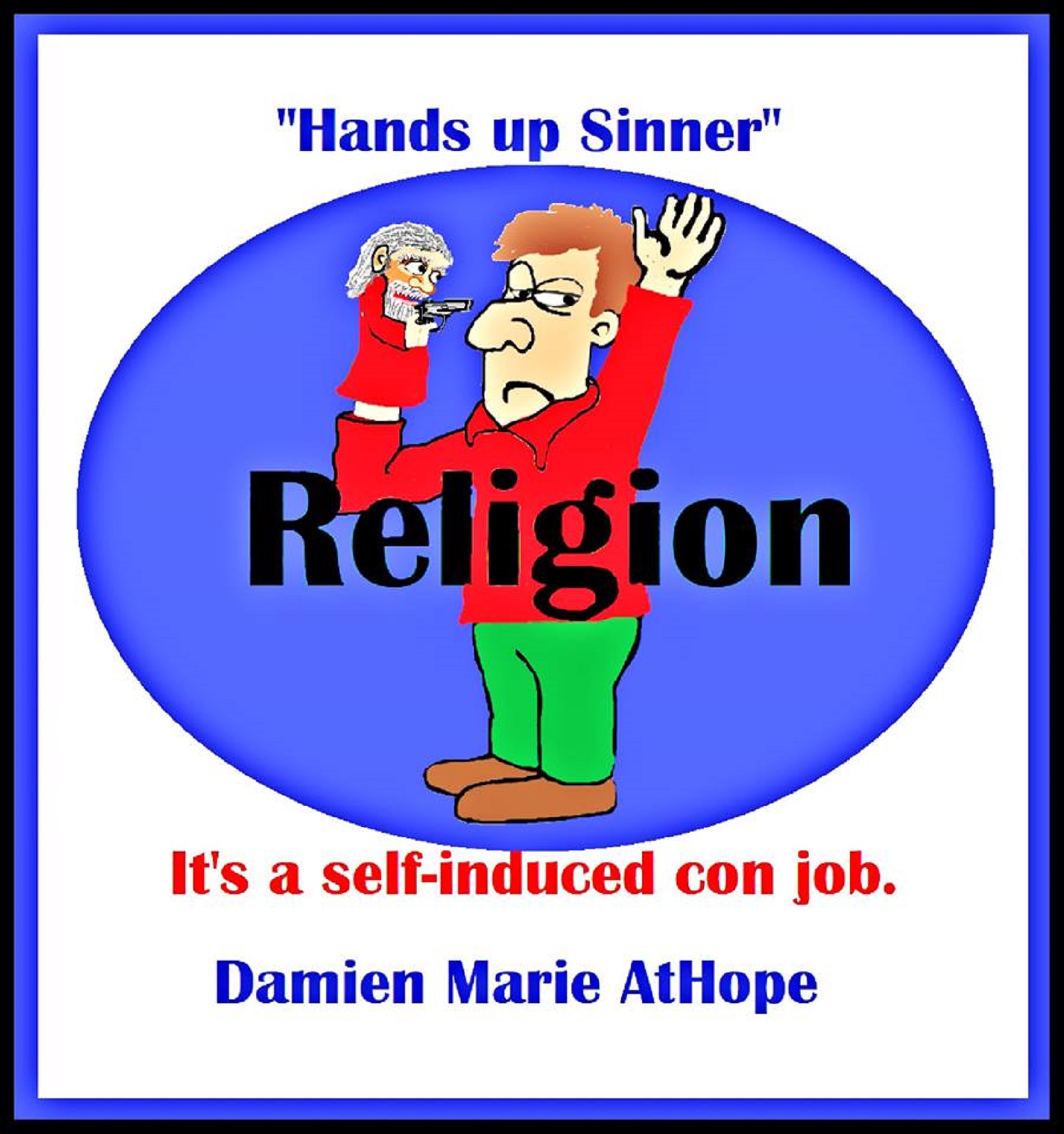
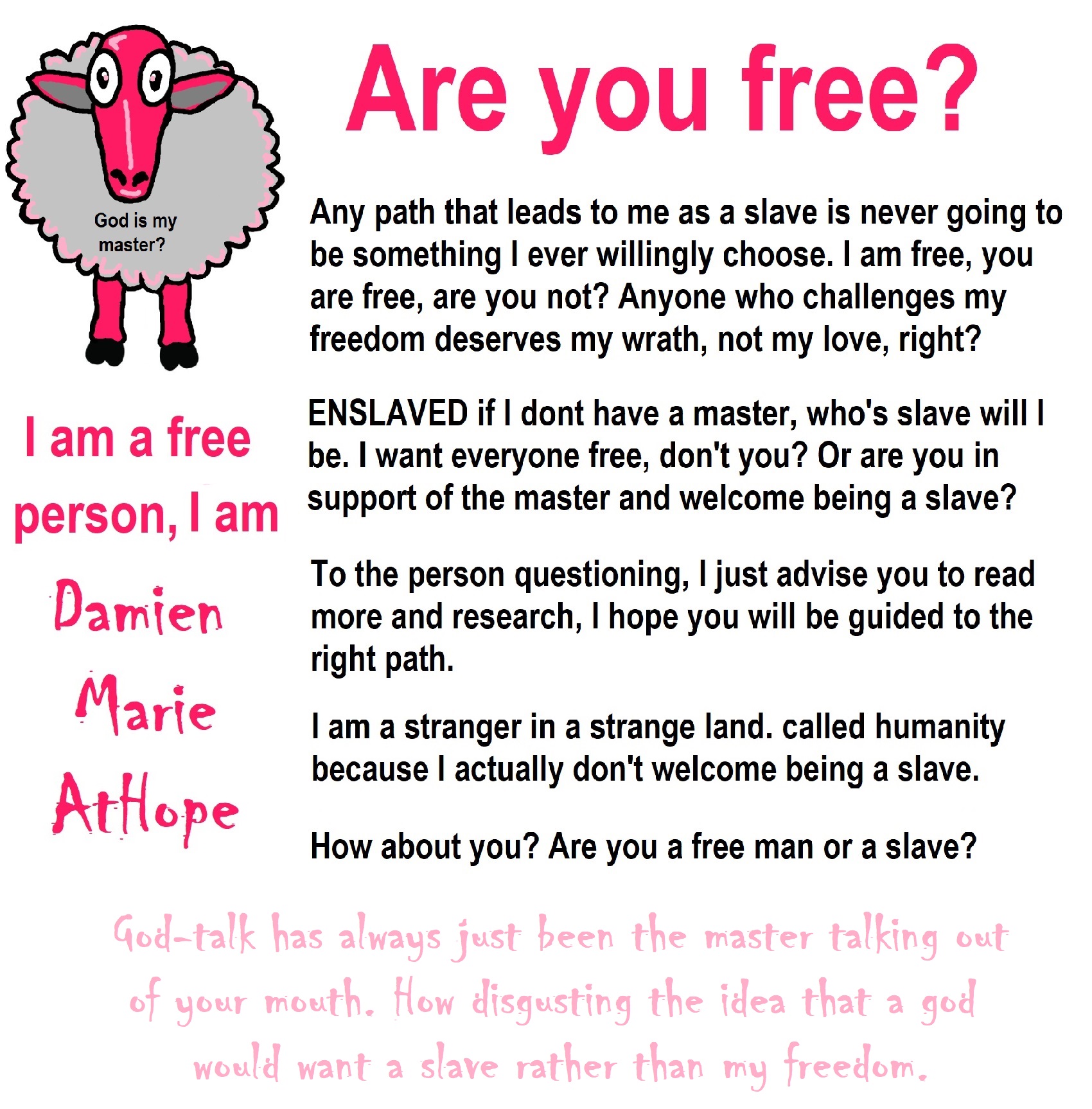

“Theists, there has to be a god, as something can not come from nothing.”
Well, thus something (unknown) happened and then there was something. This does not tell us what the something that may have been involved with something coming from nothing. A supposed first cause, thus something (unknown) happened and then there was something is not an open invitation to claim it as known, neither is it justified to call or label such an unknown as anything, especially an unsubstantiated magical thinking belief born of mythology and religious storytelling.

While hallucinogens are associated with shamanism, it is alcohol that is associated with paganism.
The Atheist-Humanist-Leftist Revolutionaries Shows in the prehistory series:
Show two: Pre-animism 300,000 years old and animism 100,000 years old: related to “Anarchism and Socialism”
Show tree: Totemism 50,000 years old: related to “Anarchism and Socialism”
Show four: Shamanism 30,000 years old: related to “Anarchism and Socialism”
Show five: Paganism 12,000 years old: related to “Anarchism and Socialism”
Show six: Emergence of hierarchy, sexism, slavery, and the new male god dominance: Paganism 7,000-5,000 years old: related to “Anarchism and Socialism” (Capitalism) (World War 0) Elite and their slaves!
Prehistory: related to “Anarchism and Socialism” the division of labor, power, rights, and recourses: VIDEO
Pre-animism 300,000 years old and animism 100,000 years old: related to “Anarchism and Socialism”: VIDEO
Totemism 50,000 years old: related to “Anarchism and Socialism”: VIDEO
Shamanism 30,000 years old: related to “Anarchism and Socialism”: VIDEO
Paganism 12,000 years old: related to “Anarchism and Socialism” (Pre-Capitalism): VIDEO
Paganism 7,000-5,000 years old: related to “Anarchism and Socialism” (Capitalism) (World War 0) Elite and their slaves: VIEDO
Paganism 5,000 years old: progressed organized religion and the state: related to “Anarchism and Socialism” (Kings and the Rise of the State): VIEDO
Paganism 4,000 years old: related to “Anarchism and Socialism” (First Moralistic gods, then the Origin time of Monotheism): VIEDO
I do not hate simply because I challenge and expose myths or lies any more than others being thought of as loving simply because of the protection and hiding from challenge their favored myths or lies.
The truth is best championed in the sunlight of challenge.
An archaeologist once said to me “Damien religion and culture are very different”
My response, So are you saying that was always that way, such as would you say Native Americans’ cultures are separate from their religions? And do you think it always was the way you believe?
I had said that religion was a cultural product. That is still how I see it and there are other archaeologists that think close to me as well. Gods too are the myths of cultures that did not understand science or the world around them, seeing magic/supernatural everywhere.
I personally think there is a goddess and not enough evidence to support a male god at Çatalhöyük but if there was both a male and female god and goddess then I know the kind of gods they were like Proto-Indo-European mythology.
This series idea was addressed in, Anarchist Teaching as Free Public Education or Free Education in the Public: VIDEO
Our 12 video series: Organized Oppression: Mesopotamian State Force and the Politics of power (9,000-4,000 years ago), is adapted from: The Complete and Concise History of the Sumerians and Early Bronze Age Mesopotamia (7000-2000 BC): https://www.youtube.com/watch?v=szFjxmY7jQA by “History with Cy“
Show #1: Mesopotamian State Force and the Politics of Power (Samarra, Halaf, Ubaid)
Show #2: Mesopotamian State Force and the Politics of Power
Show #3: Mesopotamian State Force and the Politics of Power (Uruk and the First Cities)
Show #4: Mesopotamian State Force and the Politics of Power (First Kings)
Show #5: Mesopotamian State Force and the Politics of Power (Early Dynastic Period)
Show #6: Mesopotamian State Force and the Politics of Power
Show #7: Mesopotamian State Force and the Politics of Power (Sargon and Akkadian Rule)
Show #9: Mesopotamian State Force and the Politics of Power (Gudea of Lagash and Utu-hegal)
Show #12: Mesopotamian State Force and the Politics of Power (Aftermath and Legacy of Sumer)

The “Atheist-Humanist-Leftist Revolutionaries”
Cory Johnston ☭ Ⓐ Atheist Leftist @Skepticallefty & I (Damien Marie AtHope) @AthopeMarie (my YouTube & related blog) are working jointly in atheist, antitheist, antireligionist, antifascist, anarchist, socialist, and humanist endeavors in our videos together, generally, every other Saturday.
Why Does Power Bring Responsibility?
Think, how often is it the powerless that start wars, oppress others, or commit genocide? So, I guess the question is to us all, to ask, how can power not carry responsibility in a humanity concept? I know I see the deep ethical responsibility that if there is power their must be a humanistic responsibility of ethical and empathic stewardship of that power. Will I be brave enough to be kind? Will I possess enough courage to be compassionate? Will my valor reach its height of empathy? I as everyone, earns our justified respect by our actions, that are good, ethical, just, protecting, and kind. Do I have enough self-respect to put my love for humanity’s flushing, over being brought down by some of its bad actors? May we all be the ones doing good actions in the world, to help human flourishing.
I create the world I want to live in, striving for flourishing. Which is not a place but a positive potential involvement and promotion; a life of humanist goal precision. To master oneself, also means mastering positive prosocial behaviors needed for human flourishing. I may have lost a god myth as an atheist, but I am happy to tell you, my friend, it is exactly because of that, leaving the mental terrorizer, god belief, that I truly regained my connected ethical as well as kind humanity.
Cory and I will talk about prehistory and theism, addressing the relevance to atheism, anarchism, and socialism.
At the same time as the rise of the male god, 7,000 years ago, there was also the very time there was the rise of violence, war, and clans to kingdoms, then empires, then states. It is all connected back to 7,000 years ago, and it moved across the world.
Cory Johnston: https://damienmarieathope.com/2021/04/cory-johnston-mind-of-a-skeptical-leftist/?v=32aec8db952d
The Mind of a Skeptical Leftist (YouTube)
Cory Johnston: Mind of a Skeptical Leftist @Skepticallefty
The Mind of a Skeptical Leftist By Cory Johnston: “Promoting critical thinking, social justice, and left-wing politics by covering current events and talking to a variety of people. Cory Johnston has been thoughtfully talking to people and attempting to promote critical thinking, social justice, and left-wing politics.” http://anchor.fm/skepticalleft
Cory needs our support. We rise by helping each other.
Cory Johnston ☭ Ⓐ @Skepticallefty Evidence-based atheist leftist (he/him) Producer, host, and co-host of 4 podcasts @skeptarchy @skpoliticspod and @AthopeMarie
Damien Marie AtHope (“At Hope”) Axiological Atheist, Anti-theist, Anti-religionist, Secular Humanist. Rationalist, Writer, Artist, Poet, Philosopher, Advocate, Activist, Psychology, and Armchair Archaeology/Anthropology/Historian.
Damien is interested in: Freedom, Liberty, Justice, Equality, Ethics, Humanism, Science, Atheism, Antiteism, Antireligionism, Ignosticism, Left-Libertarianism, Anarchism, Socialism, Mutualism, Axiology, Metaphysics, LGBTQI, Philosophy, Advocacy, Activism, Mental Health, Psychology, Archaeology, Social Work, Sexual Rights, Marriage Rights, Woman’s Rights, Gender Rights, Child Rights, Secular Rights, Race Equality, Ageism/Disability Equality, Etc. And a far-leftist, “Anarcho-Humanist.”
I am not a good fit in the atheist movement that is mostly pro-capitalist, I am anti-capitalist. Mostly pro-skeptic, I am a rationalist not valuing skepticism. Mostly pro-agnostic, I am anti-agnostic. Mostly limited to anti-Abrahamic religions, I am an anti-religionist.
To me, the “male god” seems to have either emerged or become prominent around 7,000 years ago, whereas the now favored monotheism “male god” is more like 4,000 years ago or so. To me, the “female goddess” seems to have either emerged or become prominent around 11,000-10,000 years ago or so, losing the majority of its once prominence around 2,000 years ago due largely to the now favored monotheism “male god” that grow in prominence after 4,000 years ago or so.
My Thought on the Evolution of Gods?
Animal protector deities from old totems/spirit animal beliefs come first to me, 13,000/12,000 years ago, then women as deities 11,000/10,000 years ago, then male gods around 7,000/8,000 years ago. Moralistic gods around 5,000/4,000 years ago, and monotheistic gods around 4,000/3,000 years ago.
To me, animal gods were likely first related to totemism animals around 13,000 to 12,000 years ago or older. Female as goddesses was next to me, 11,000 to 10,000 years ago or so with the emergence of agriculture. Then male gods come about 8,000 to 7,000 years ago with clan wars. Many monotheism-themed religions started in henotheism, emerging out of polytheism/paganism.

Damien Marie AtHope (Said as “At” “Hope”)/(Autodidact Polymath but not good at math):
Axiological Atheist, Anti-theist, Anti-religionist, Secular Humanist, Rationalist, Writer, Artist, Jeweler, Poet, “autodidact” Philosopher, schooled in Psychology, and “autodidact” Armchair Archaeology/Anthropology/Pre-Historian (Knowledgeable in the range of: 1 million to 5,000/4,000 years ago). I am an anarchist socialist politically. Reasons for or Types of Atheism
My Website, My Blog, & Short-writing or Quotes, My YouTube, Twitter: @AthopeMarie, and My Email: damien.marie.athope@gmail.com

